I accompanied someone to view Iris van Herpen’s fashion design exhibition named “Sculpting the Senses”.
There are nine rooms; each showcasing a different theme. They are Water and Dreams, Sensory Sea Life, Forces Behind the Forms, Skeletal Embodiment, Growth Systems, Synaesthesia, Mythology of Fear, New Nature, Cosmic Bloom.
This was at the entrance of the exhibition.
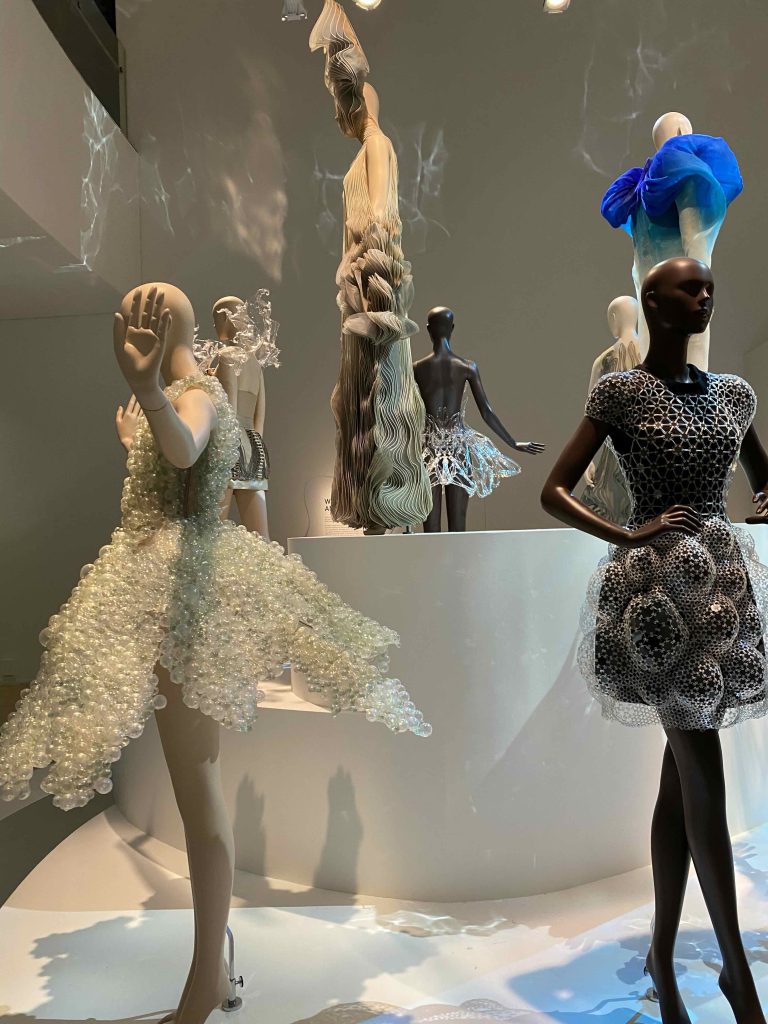
These dresses are from the Crystallization collection (2010). It is based on inspiration from the changes of different states of water, from liquid to gas to solid. It seems the liquid state of water displays the most forms of movements as in ripples, flows, waves and cascading waterfalls. The mannequin standing on top left wears a gown fashioned to replicate the cascading waterfall.
This squad of mannequin models greeted visitors to the exhibition. This cast of models aimed to take your breath away, and they succeeded. Us normal women will probably use plastic wrap to sew our own bubble dress. When we sit down, those bubbles situated to be rested on by the bum, will pop with vengeance. Everybody will turn to look. That will be the second delivery of shock.
If the bubbles are glass bubbles, I wouldn’t dare to imagine what can happen. The better bubble would be the unbreakable kind. Technology has made unbreakable glass possible. What can it feel like, to sit on bubbles? The texture of many small balls against skin! It is kind of like many small balls acting a passive massage on skin.
When you next get a free, large piece of bubble wrap or a sheet of air bubble packaging plastic, sit on it. How does it feel?
The curator of the this exhibition was at the door to meet and greet visitors. This is what he said, or near what he said, to the effect of admonitions.
“Now before you enter, here’s a couple of reminders. Please don’t touch the bubbles. They look like plastic, but they’re made of glass. Next, when you step back to take photos, be careful you don’t fall backwards over the kerb barriers around the mannequins.” (He omitted to say the careless visitor could fall all the way backwards to knock down a mannequin or two.)
Everybody proceeded to walk gingerly around the lobby’s central display, which was a multi-tiered dais.
No, the mannequins are not standing on tip toe because they are short. Its because they were made to wear high heeled shoes but the window display artistes decided against complicating their wardrobes and have left them barefoot.
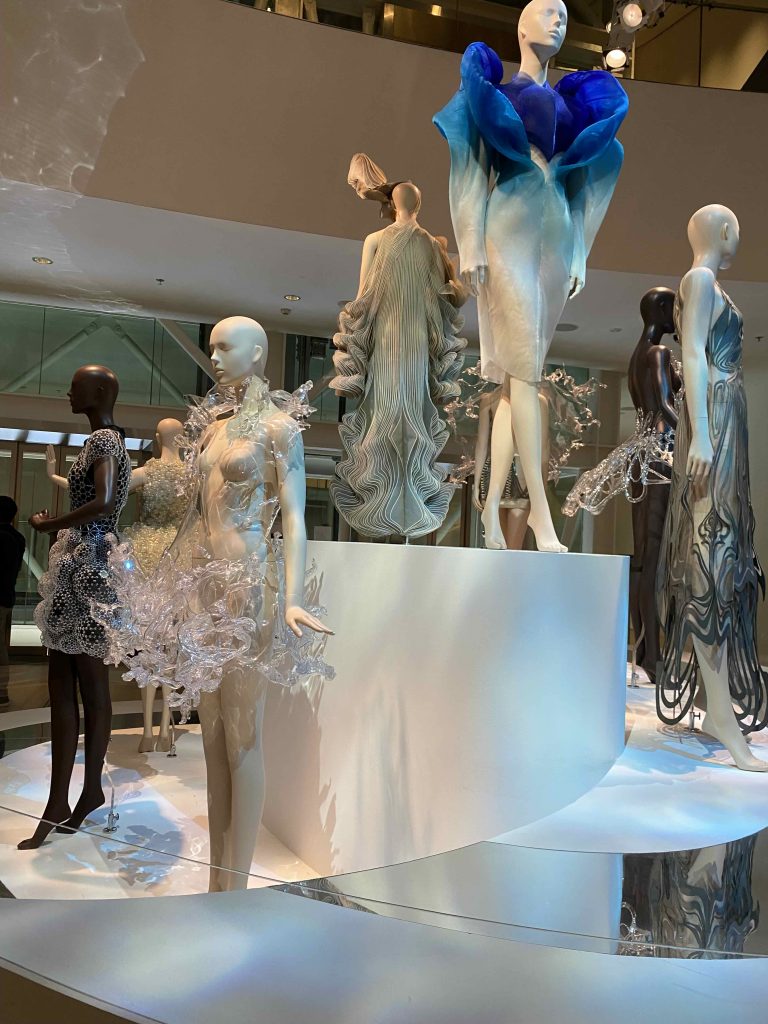
If it looks like glass, it probably is glass. What a pretty, feminine, flouncy skirt. From its intricate design, it looks like it is mouth-blown glass.
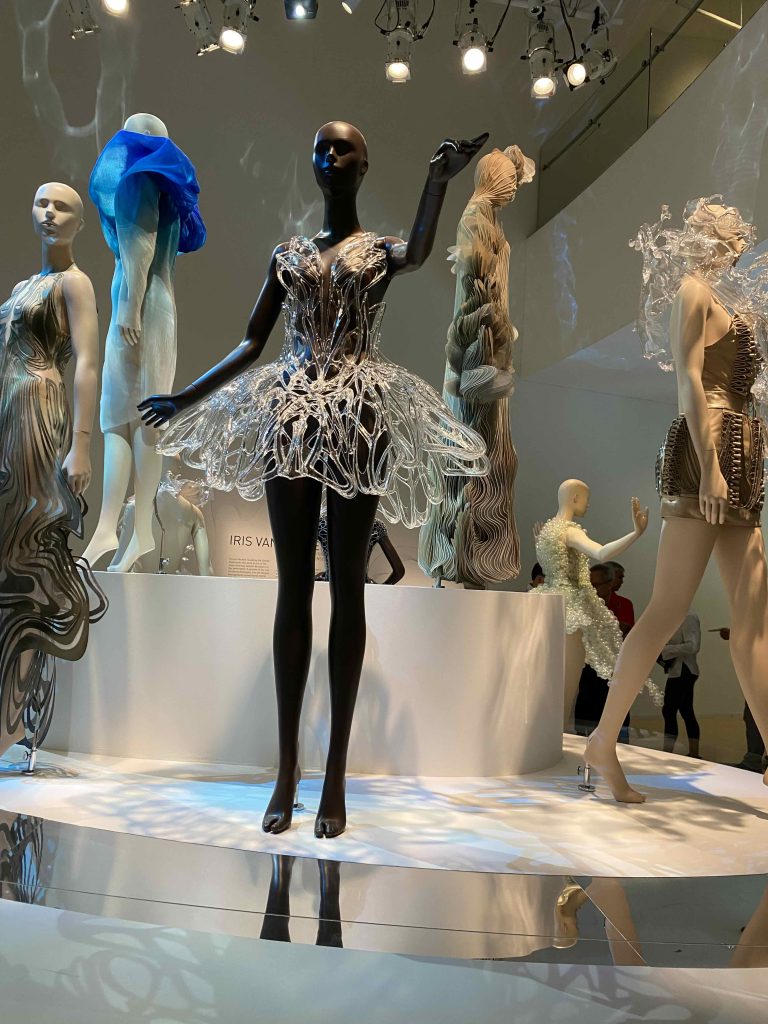
This glass dress looks like it was inspired by the human body’s complex network of arteries, veins and capillaries. The dresses which look like they consist of only intricate designs, actually have a nude slip layer underneath. It functions like a full slip dress petticoat. This isn’t visible in the photos, but visitors can see it firsthand on the display.
The dais is not necessarily the best stage. The best is yet to come.
Ms van Herpen integrates fashion art, technology and science, to create her “fabrics”. The dress materials don’t look like fabrics at all because they are made from knowledge of science and technology. take a leaf from her book. If at first you can’t find the fabric you want, use a 3D printer to invent your own material.
The colors are applied manually. No coloring is left to chance.
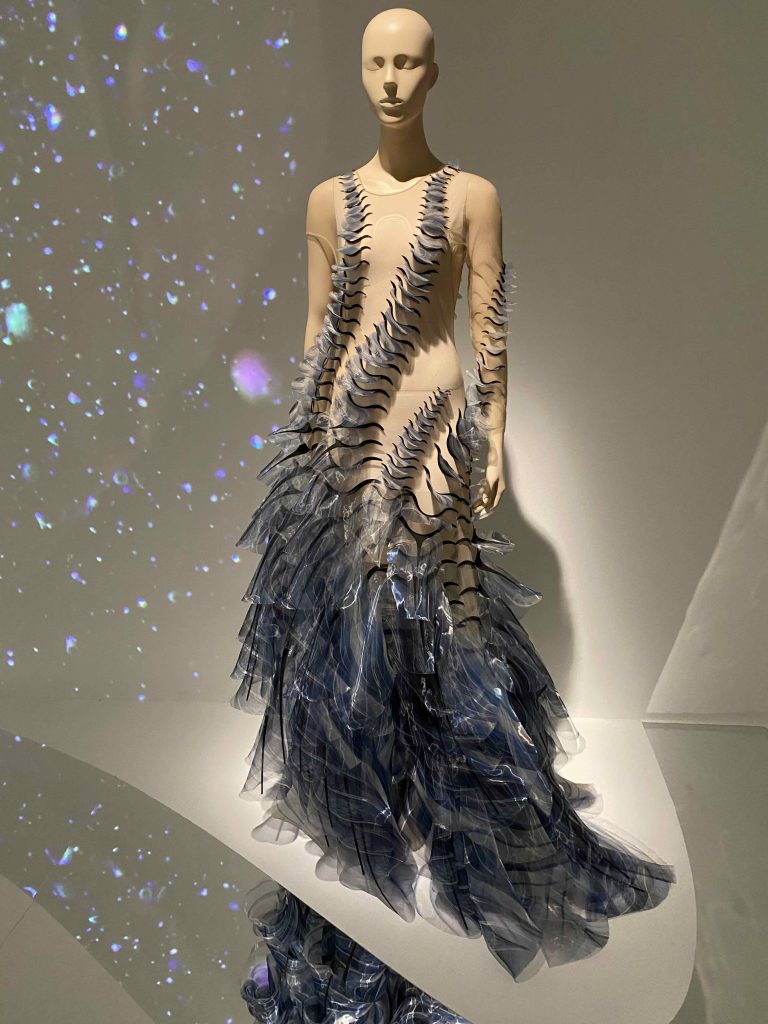
You can see the full dress nude (color) slip on this mannequin. The joined segments look like a long milliped. The intricate frills created flounce for the maxi length skirt. The skirt has a variation of the top’s segmented pattern. The differences in pattern design adds interest to the dress. The dress has two main strands traveling from the shoulder blades down, to provide coverage for protecting the modesty. The third strand of segments starts from the hip, moving down over the crotch.
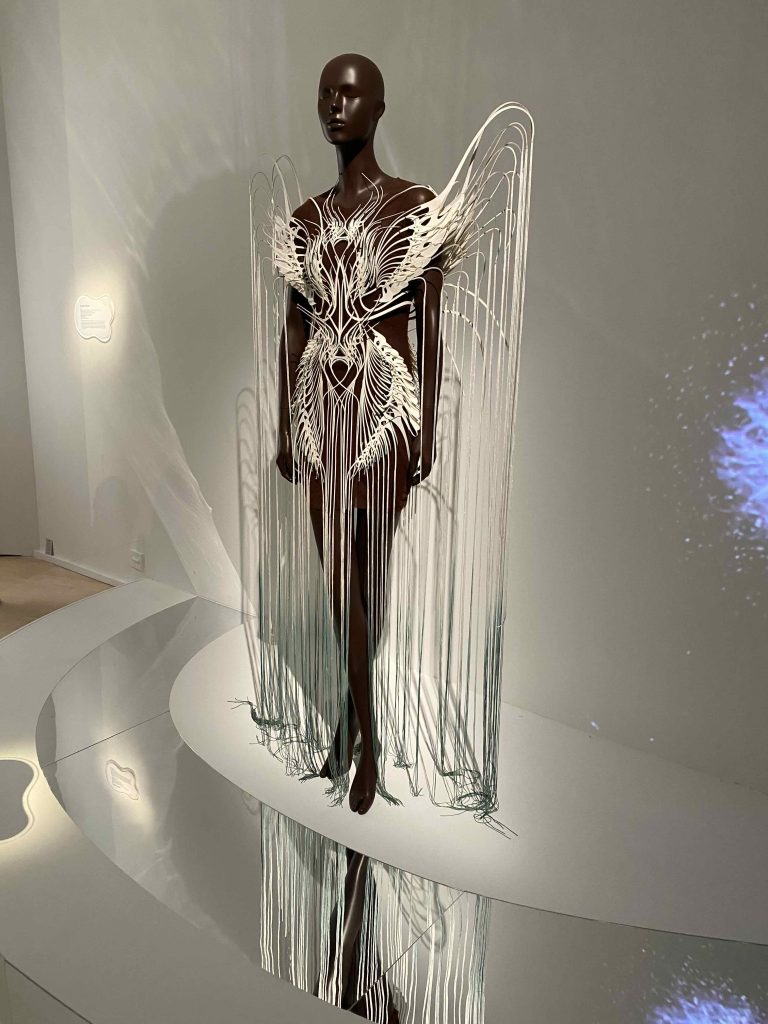
This ornamental dress looks like an insect with fore wings and hind wings. The tassels hanging from the wings add more flair to the design.
Who are the celebrities who wear Iris van Herpen’s dresses?
They are:
Ariana Grande,
Beyoncé,
Björk,
Céline Dion,
Grimes,
Gwendoline Christi,
Hailee Steinfeld,
Jennifer Lopez,
Lady Gaga,
Lorde
Milla Jovovich,
Queen Maxima of the Netherlands,
Scarlett Johansson.
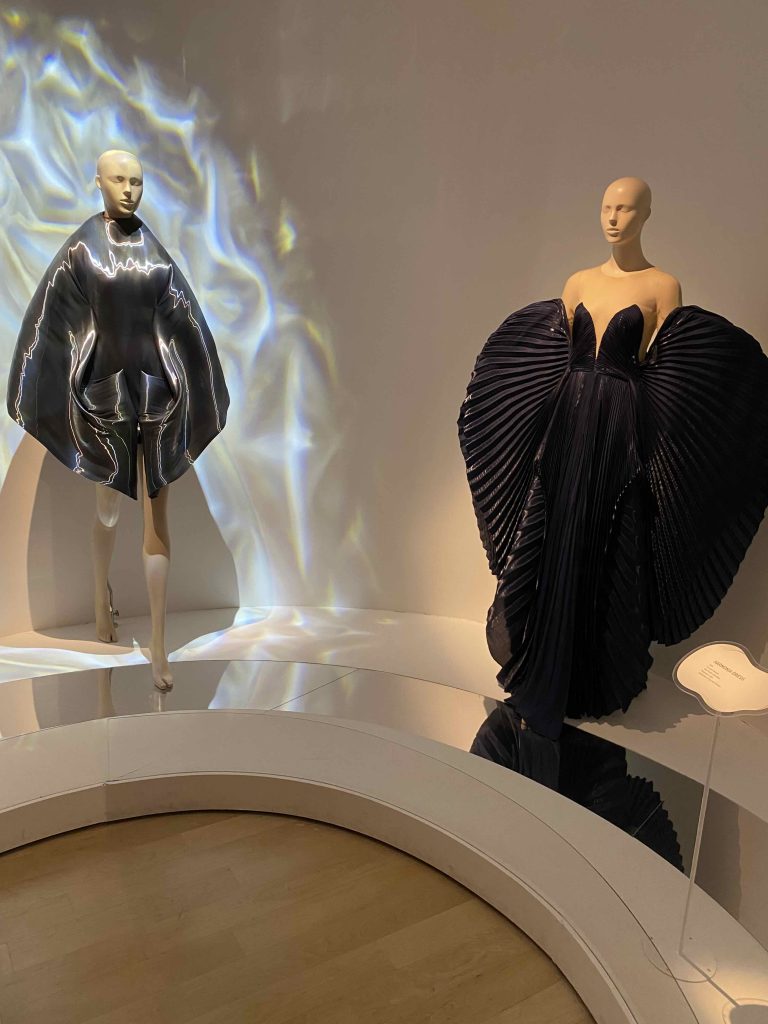
Of these two black numbers, I like the little black number on the left. The dress’ fabric reflects light, as seen by the luminescence thrown on the wall. If you’re attending a dance event, the black ball gown is a head turner.
The mannequin on the right wears the Harmonica Dress.
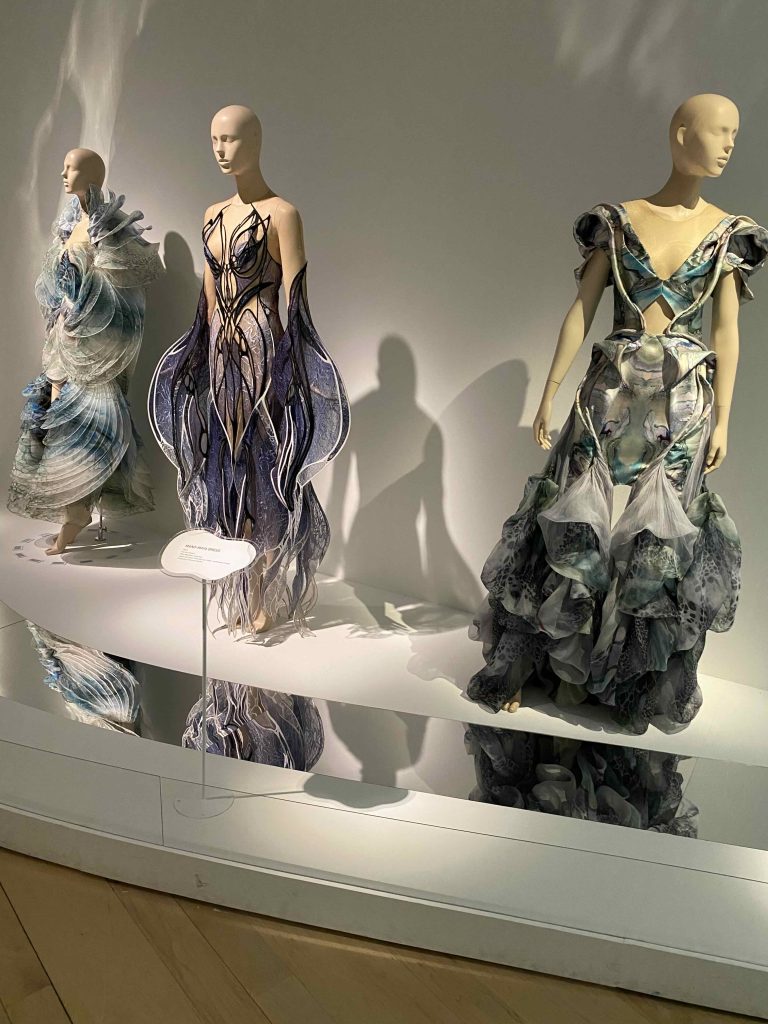
The mannequin on the right wears a potpurri of playsuit with flamenco flare pants.
Ms van Herpen’s elegant evening dresses flaunts the slender figure and the mannequin in the center, wearing the Mano-Maya dress, does this well. Each piece of the fabric has interlocking vein-like structure, giving the suggestion that each panel is alive. The symmetrical design adds harmony.
The mannequin on the extreme left wears a voluminous multilayered dress that imitates the pattern of a sea shell. It is the Sensory Seas Dress. Lovers of the sea will applaud the translation of the pattern to a dress. Even the colors of the sea side; off-white and blue, are soothing.
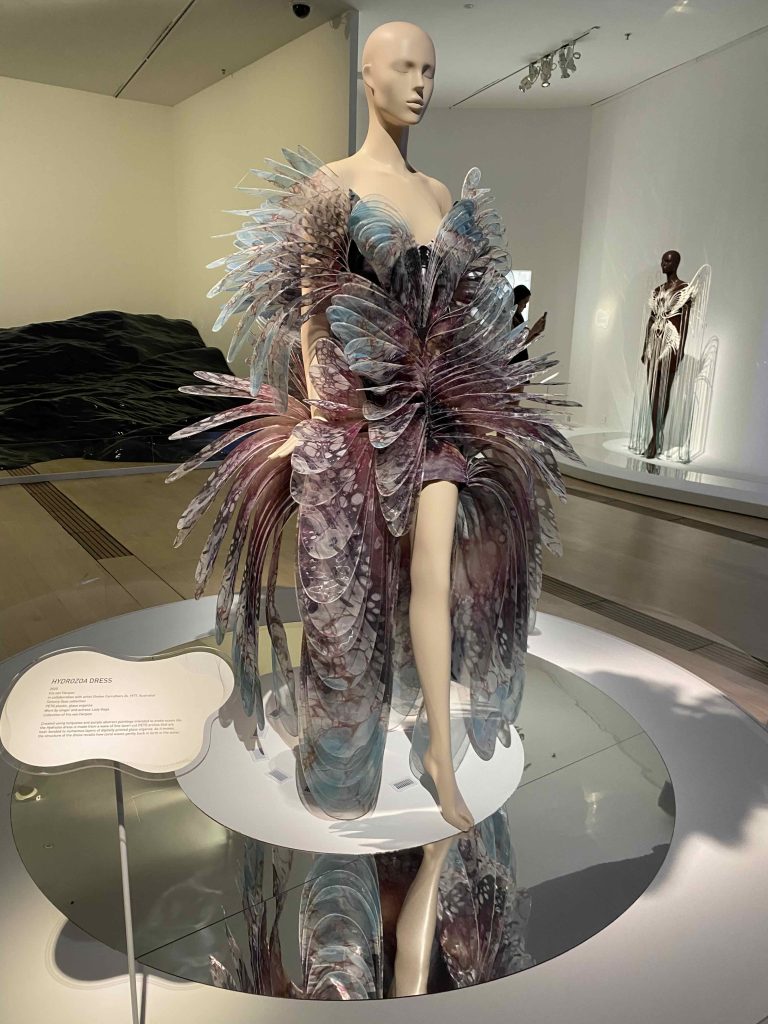
The name plate says this is the Hydrozoa Dress. The multiple layers mimic the coral waves. This dress was created in collaboration with the Australian artist Shelee Carruthers. Lady Gaga has worn this dress, when she launched her album titled Chromatica. The different parts/ appendages of the dress float, wave, shimmer and come alive while worn with the wearer walking and moving. The effects are beautiful. Sleeves flap gently, and extensions flutter like wings. Parts of the dress move, like as if they had kinetic energy.
Some plaques are not fixed at the foot of the mannequins, but are placed in between two or three mannequins. Sometimes, I’m unsure if the plaque is pointing at the right mannequin. I apologize if I made mistakes in identifying the dresses. Where possible, I have cross referenced with other sites for info.
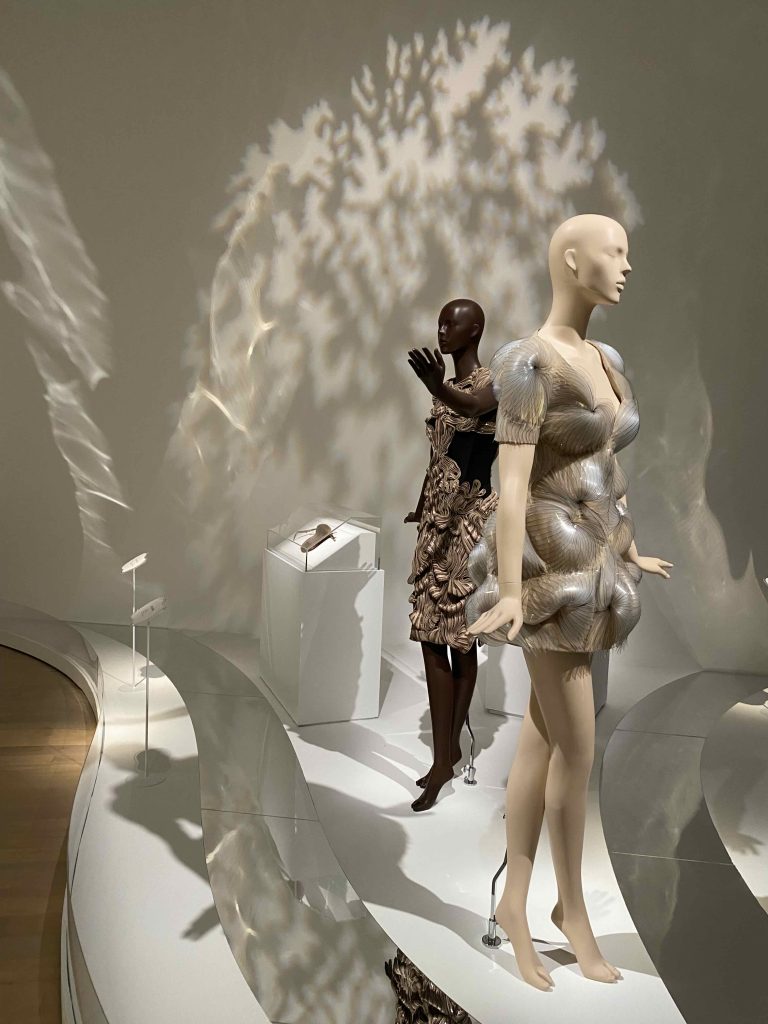
This mannequin wears a slightly bulbous, short dress. Its called the Anemone Dress. Celebrity singer Bjork once wore the Anemone. The low cut cleavage draws attention to the woman’s figure, and the puffy parts are slight to pay tribute the slim silhouette.
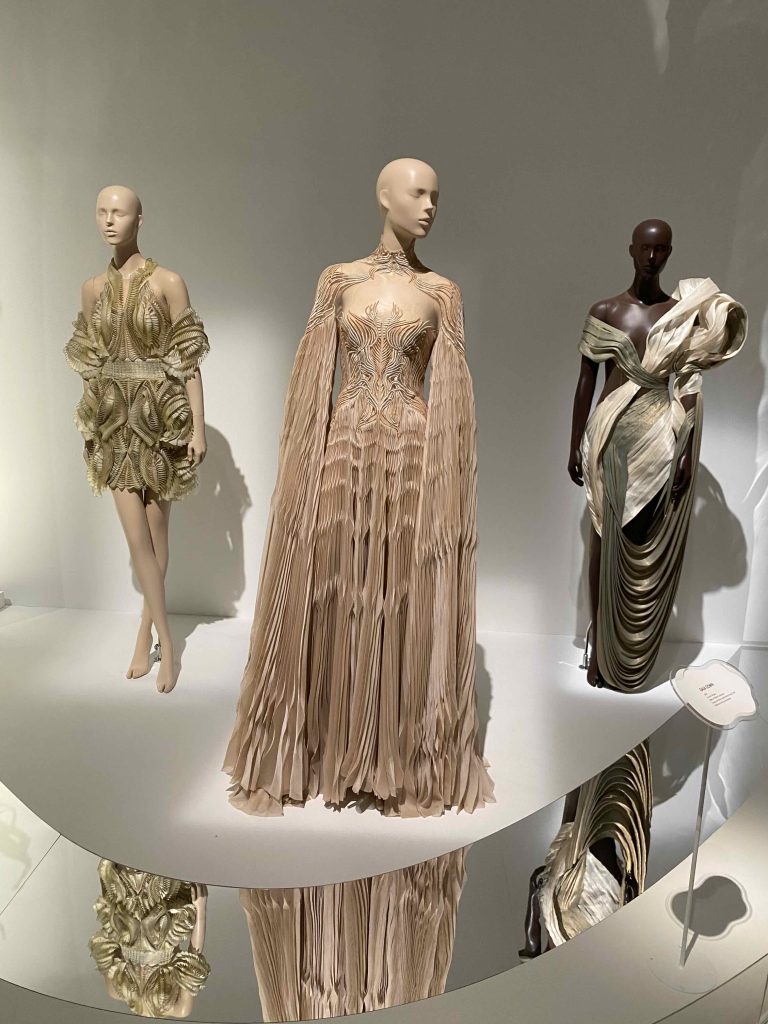
The mannequin on the extreme left wears an elaborately patterned mini dress.
The mannequin at center wears a finely pleated gown with a fitting bodice and waist. The accessory is a neck piece, from which hangs the model’s shawl, also fashioned with pleats like the main gown.
Queen Maxima of the Netherlands, wore a custom made Gaia Gown, for the opening of ‘Sculpting the Senses’ at Musée Des Arts Décoratifs in Paris.
The mannequin on the right wears the Gaia Gown, which consists of a few panels, cleverly draped across the body. The lowest panel has multiple folds, almost like a pleated drape. The mid-section panel intertwines with lowest panel to show unity. The right and left breasts are dressed in two differently colored panels. The cloths are loosely draped with great precision.
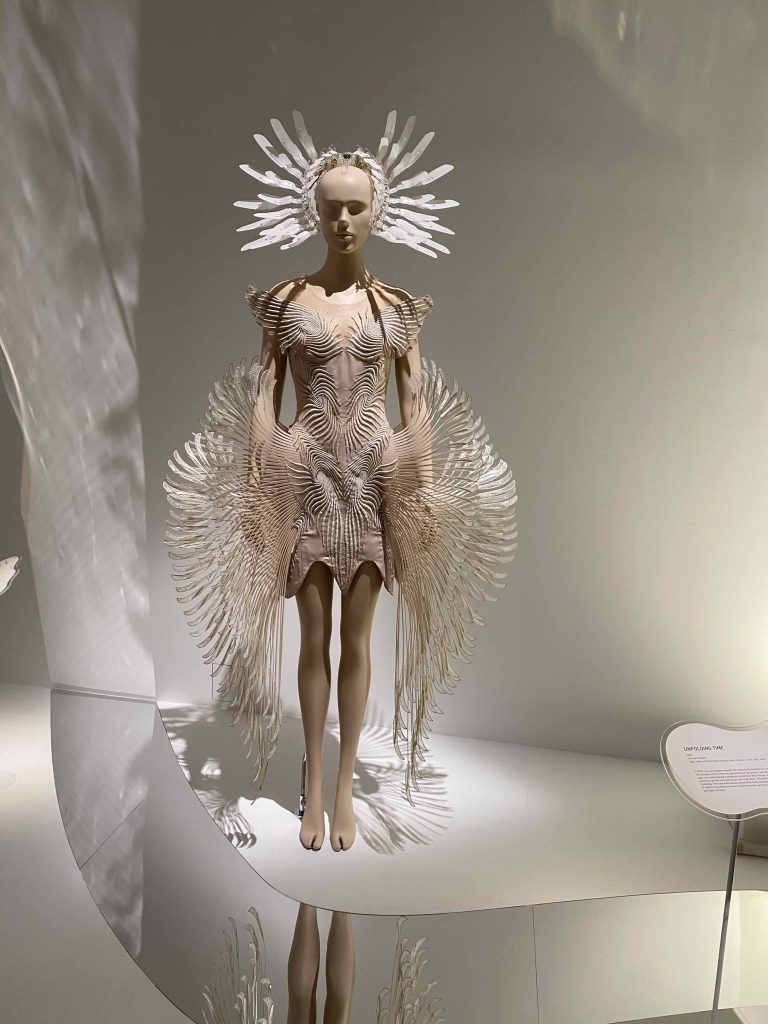
This mini dress is named Unfolding Time. The name is an irony as the pleats are folded painstakingly by hand. Many of Ms van Herpen’s dresses are designed with wings or flaps. These extensions continue the pleated theme of the dress. The model wears a head piece too, which looks like rays protruding from her head.
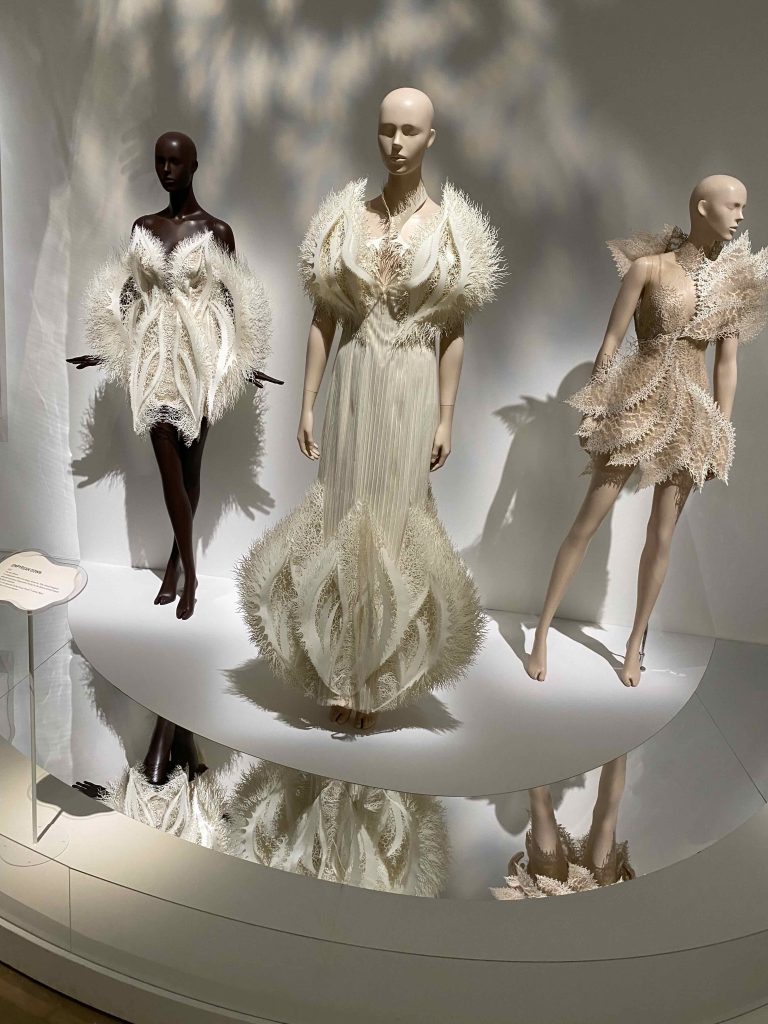
At left, is the Empyrean Gown, designed by Iris van Herpen. A variation is worn by the mannequin at center. Sometimes, Ms van Herpen is inspired to create a complementary pair of dresses, one which is a mini dress, and the other variation, a maxi dress.
The mannequin on the right wears a mini dress with beautiful details. Each leaf-like panel overlaps the one beneath it. The leaves fan out for extra detail. While the skirt and a left half sleeve is layered, the waist is kept trim, to show off a slim waist.
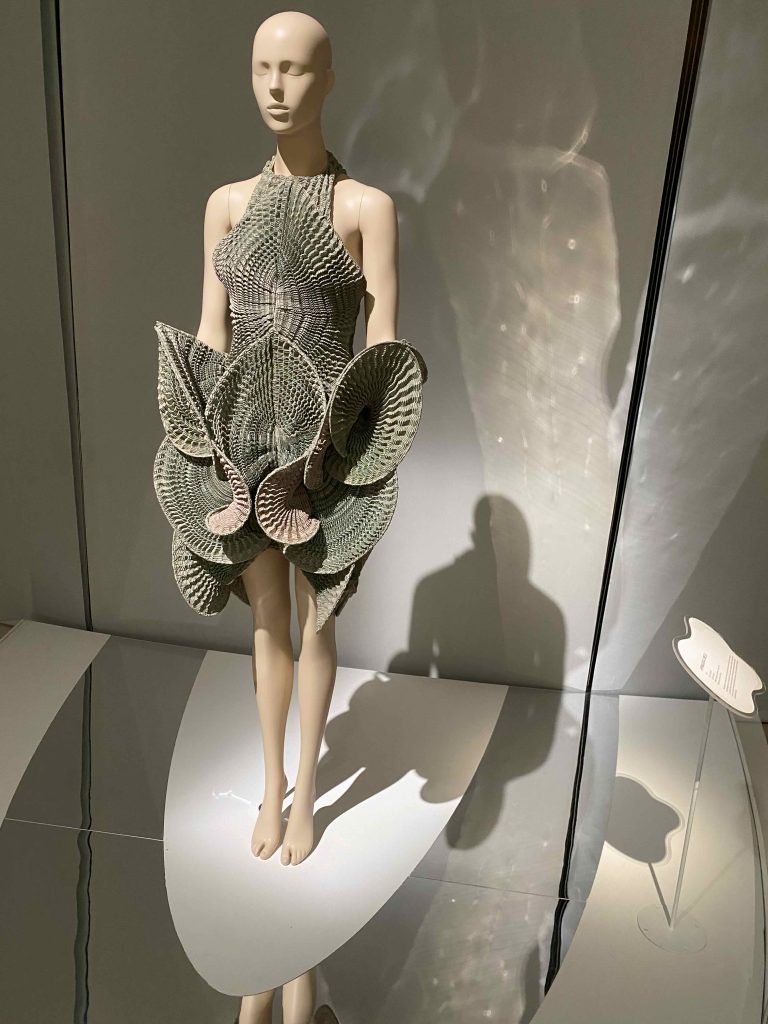
This green dress has patterned pleats and whorls. The 3-dimensional skirt is balanced by a fitting top, to present the look of symmetry.
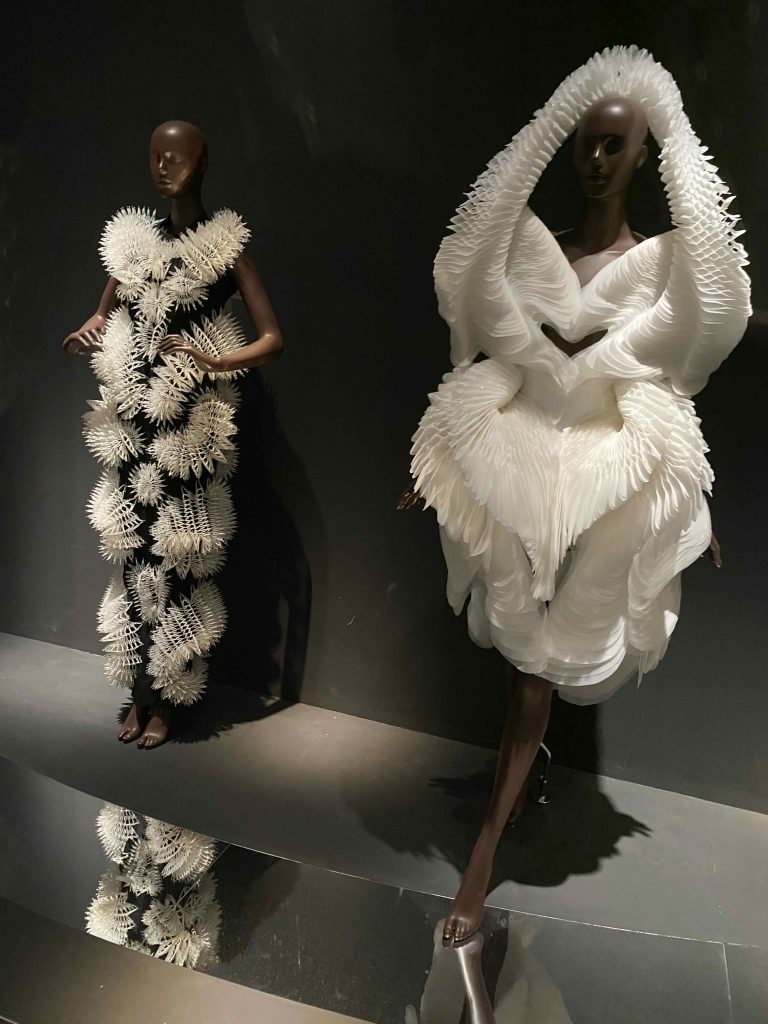
On the left, the mannequin wears a black slip base layer dress, upon which the white ornamental coils and spirals are stitched. This dress aims for symmetry, with corresponding spirals of the coils on the left and right side of the maxi dress.
The mannequin on the right wears a white dress with multi layers of white “petals”. This dress extends upwards towards the head, with a crowning arch for its head piece. This is a head turner. I think this dress is named Morphogenesis.
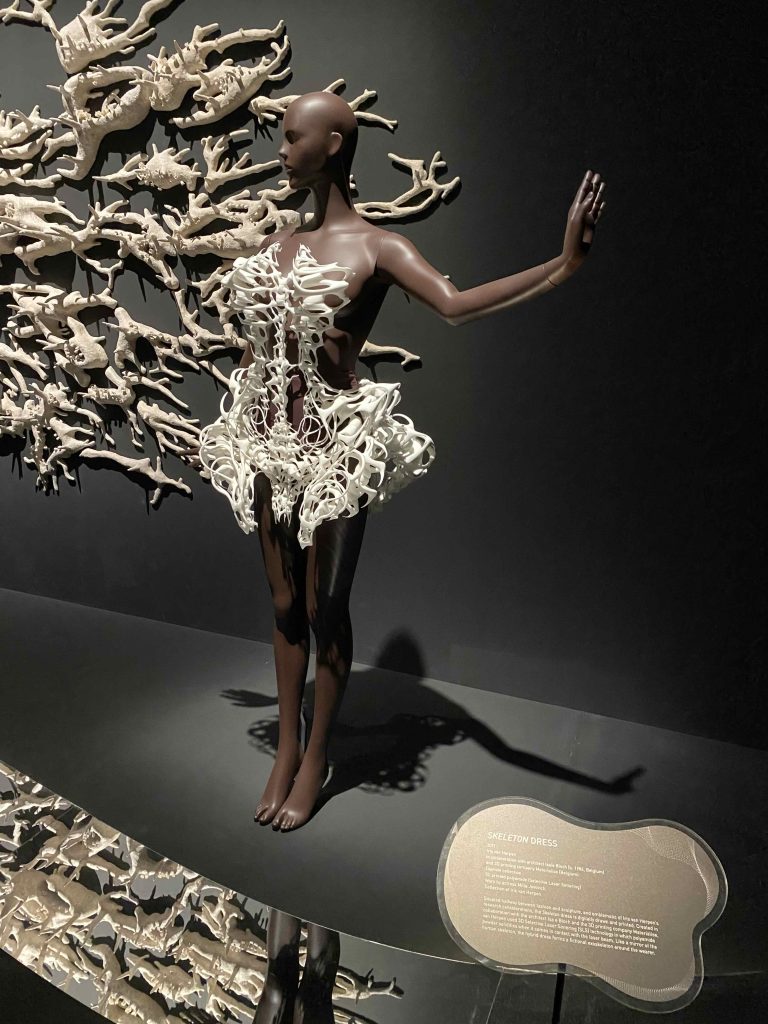
The mannequin above wears the Skeleton Dress. The design is inspired by the skeleton. The ribcage has many extra extensions to provide for the modesty of the user. The same is applied to the sensitive points. This Skeleton Dress (2011) was invented in collaboration with an architect Isaie Bloch and a 3D printer company, both from Belgium. The actress, Milla Jovovich wore the Skeleton Dress. She has a shapely, slim figure which is flattered by any type of dress.
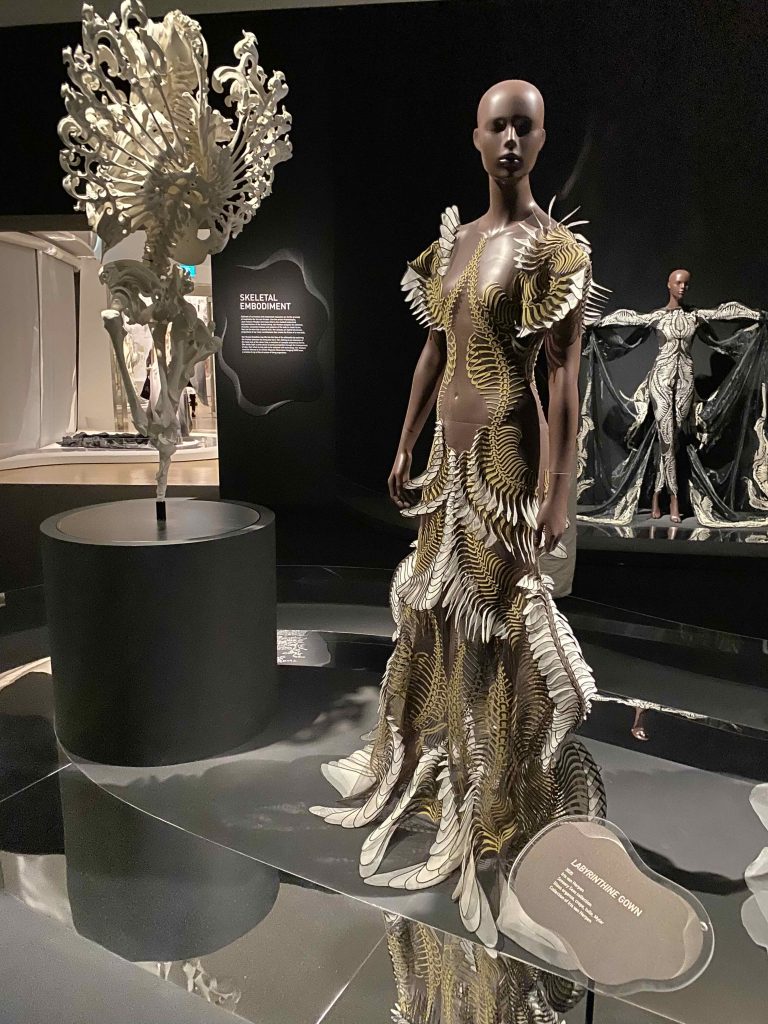
This is the Labyrinthine Gown. It was made in 2020, as a part of the Sensory Seas collection. The material is described as glass organza, crepe, tulle and Mylar. The design looks like it is composed of several long trails of different colored seaweeds.
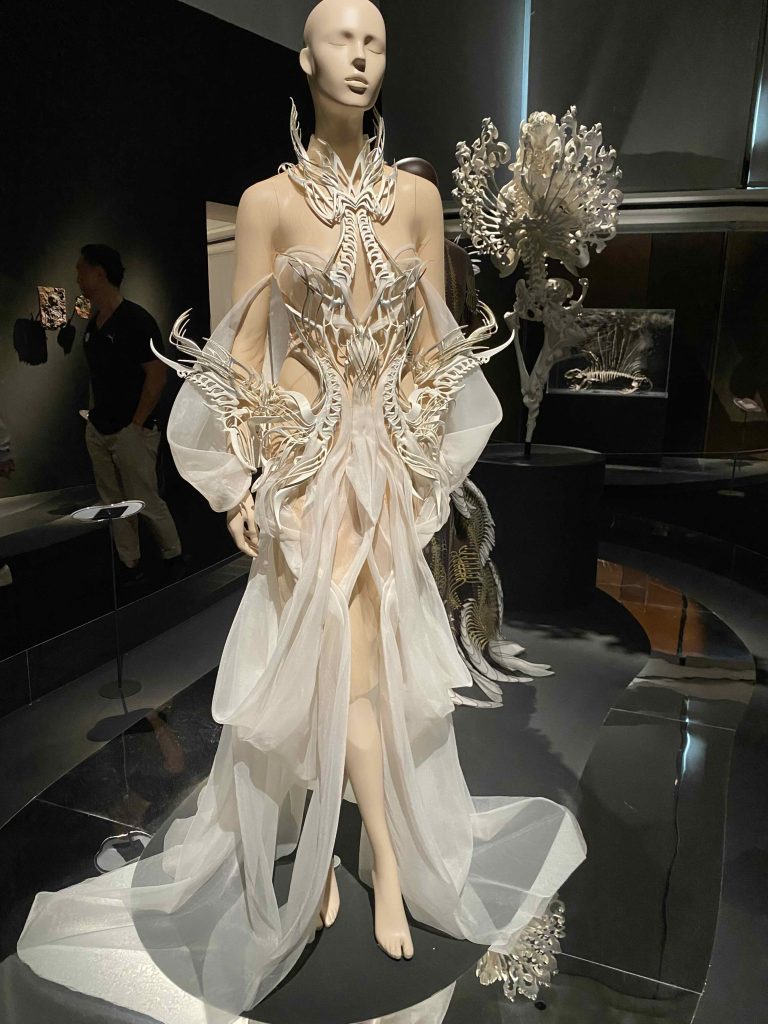
The rib cage supports the collar, which is shaped like an insect with large wings. If you look closely, the rib cage looks like big antennae of the insect. These antennae are joined downwards by a pair of wings, which serve as breast plates for the mannequin. The main body’s material looks like organza. The train of the gown has solid lace trimmings, to lend weight and glamor.
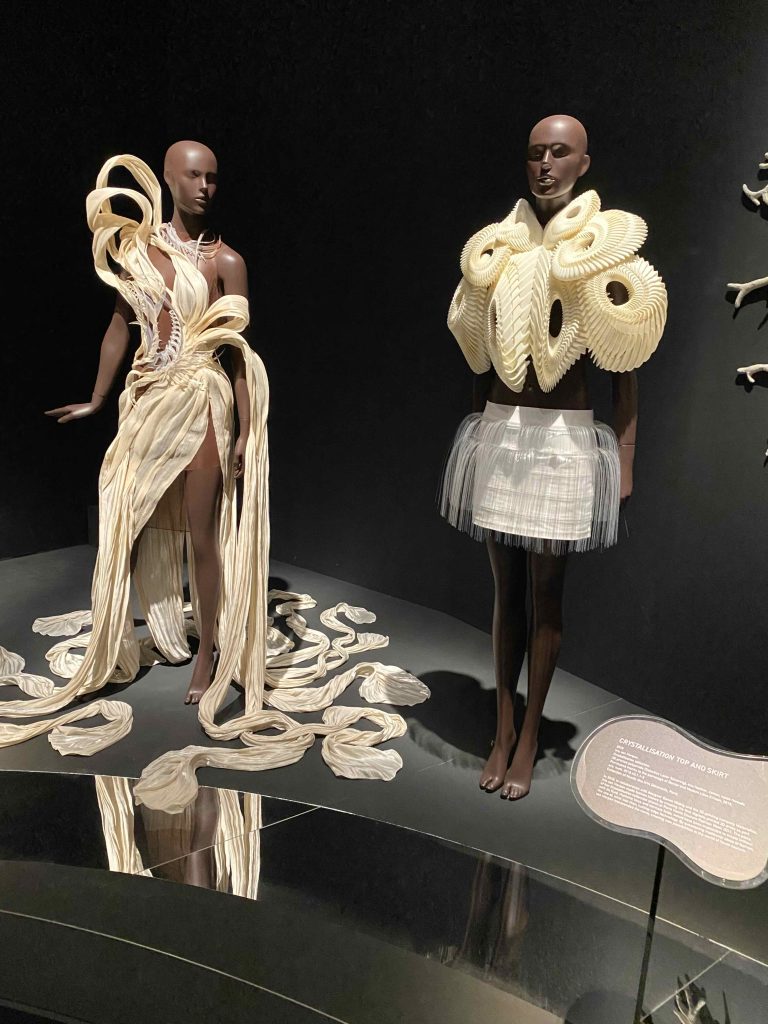
*
The mannequin at right wears the Crystallization Top and Skirt. The Crystallization series is a collaboration with architect designer Daniel Widrig. The designs are fed into a 3D printer. The printed clothes lack seams or hand sewing.
The mannequin at left wears the Cosmogonic Myth Gown. It looks like a minimalist style of bunching up fabric to create a beautiful dress that uses expansive yards of fabric. Her skirt trails out to lengths of trains. Its a good dress to pose for photos. Take care to gather the trains of fabric for safe walking for oneself as well as others.
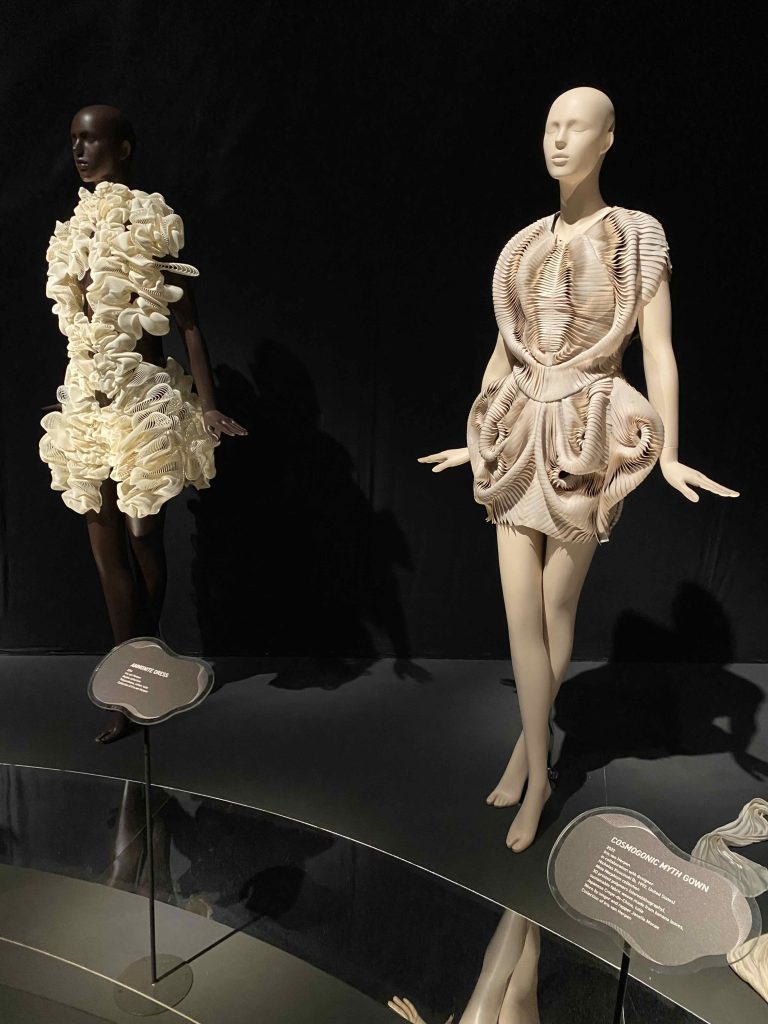
*
Mannequin at left wears the Escapism Top and Skirt (2011).
*
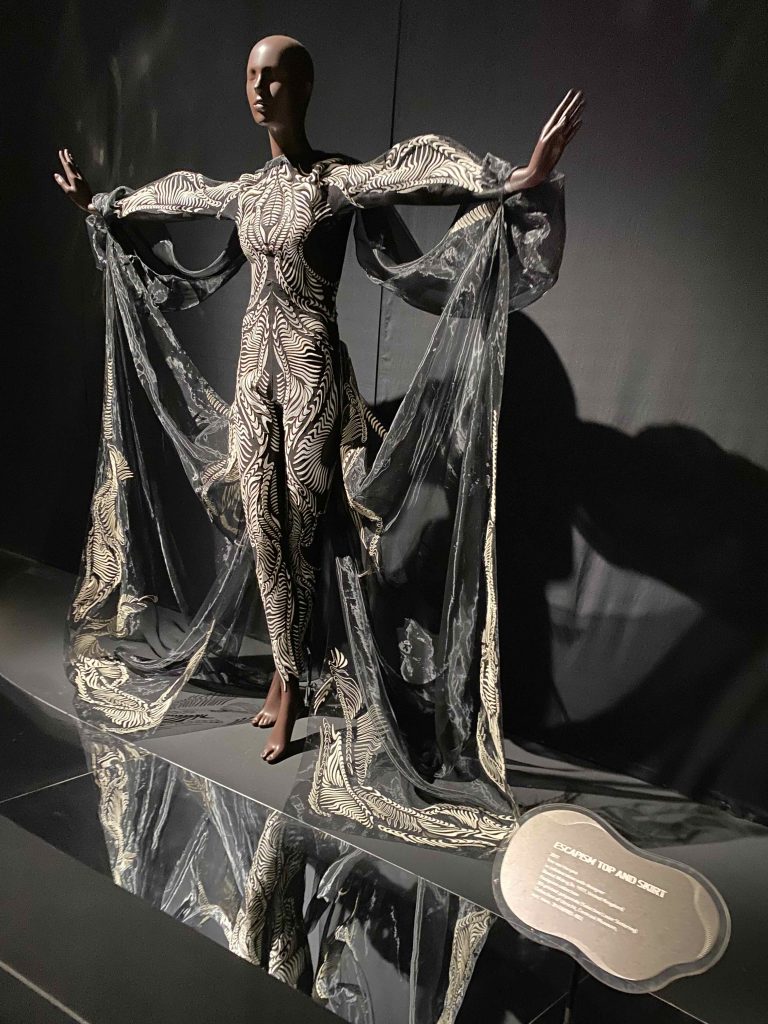
*
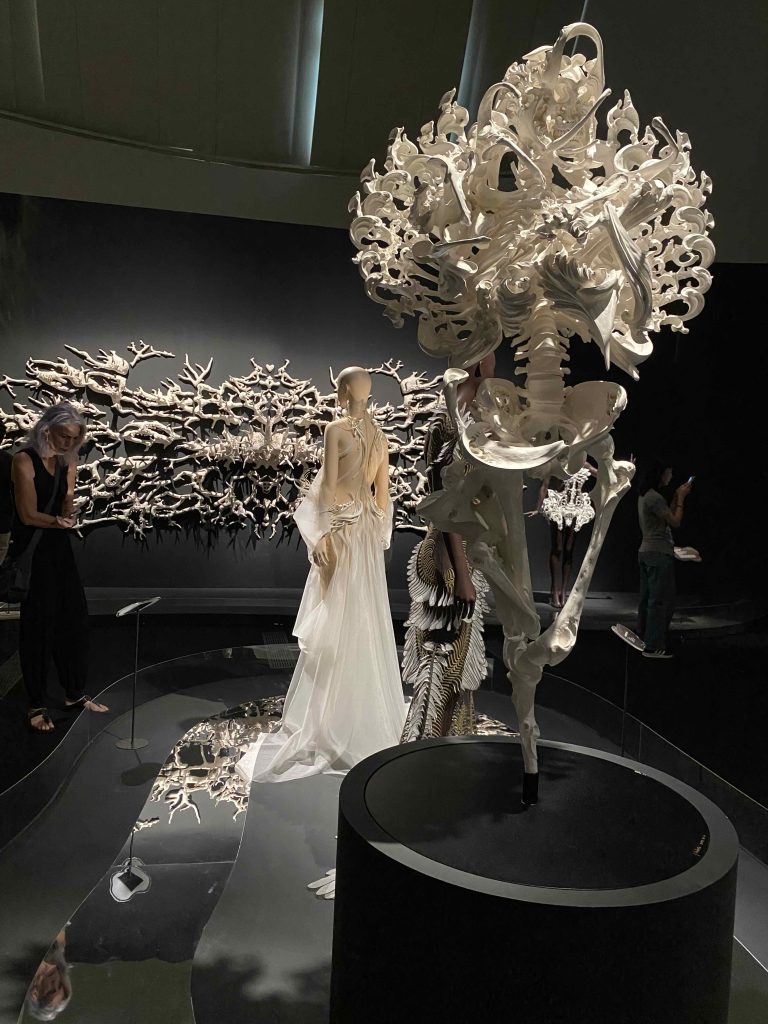
*
The above is the room of designs Ms van Herpen collaborated with Courtney Mattison.
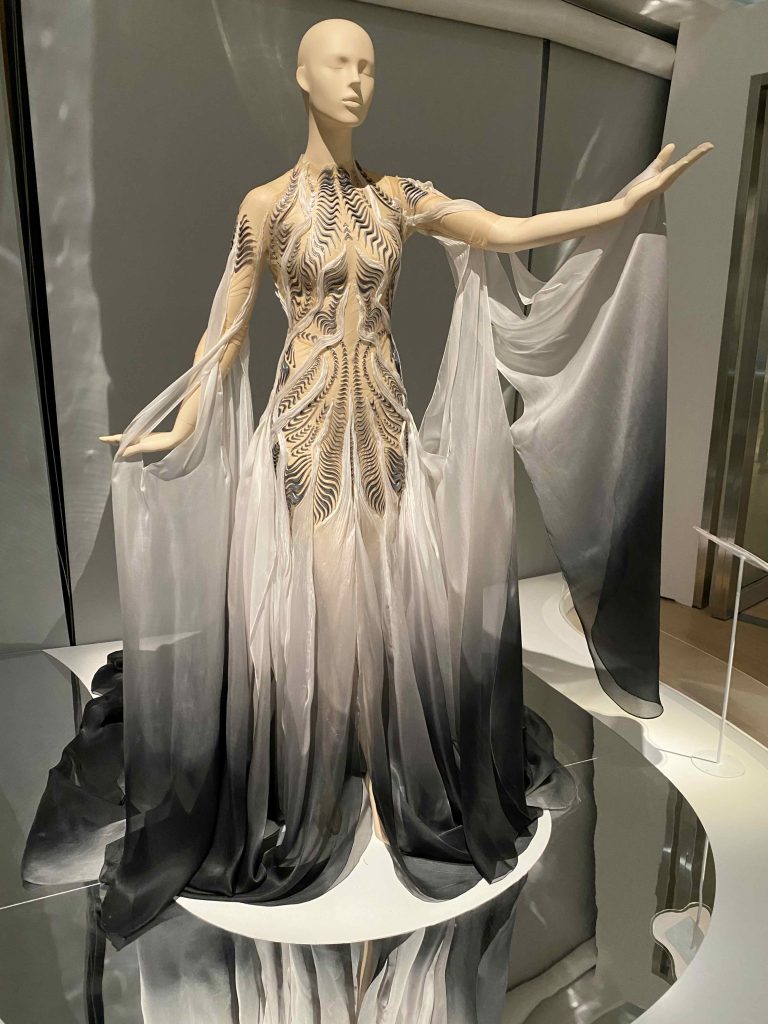
*
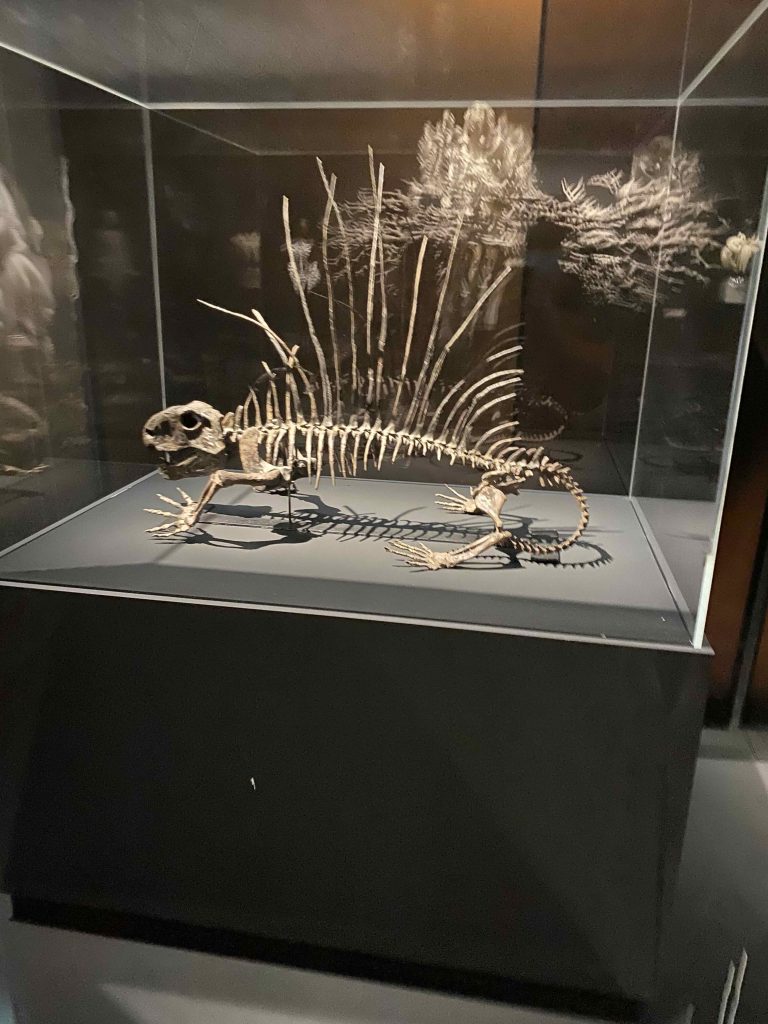
*
Since Ms van Herpen’s fashion is inspired by everything under the sun, this prehistoric skeleton is also displayed. Skeletons can be worn outside the body as dresses.
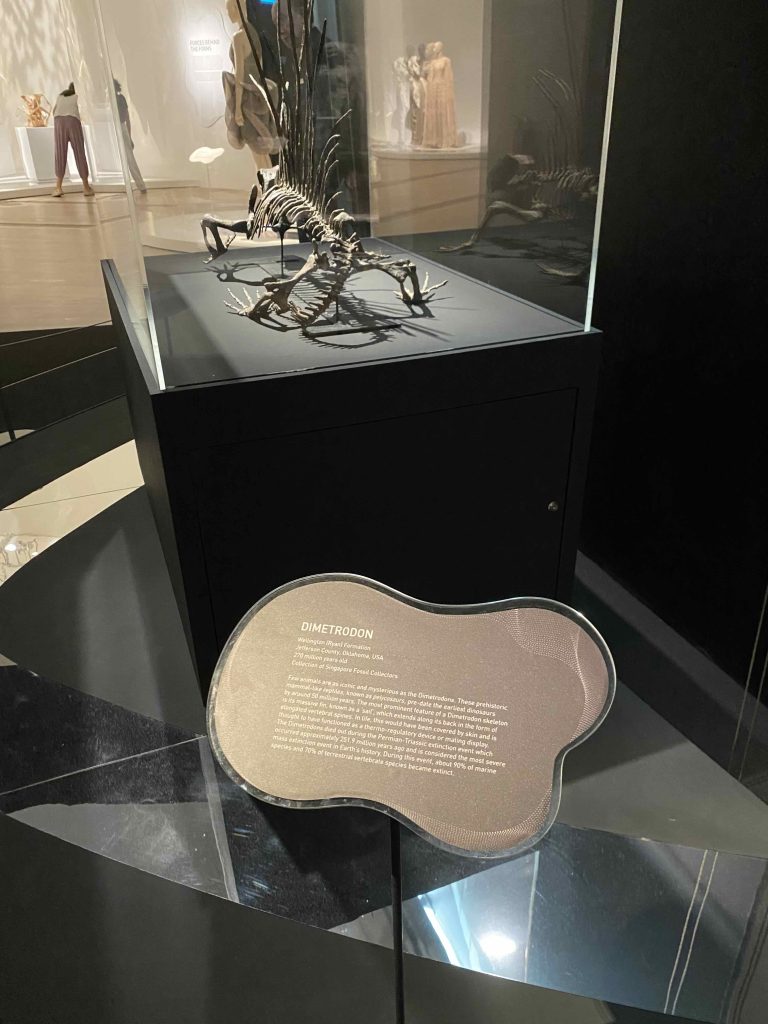
Plaque for the Dimetrodon. It was a prehistoric mammal-like reptile. It lived even before the dinosaurs, by 50 million years before they came to be. Dimetrodons became extinct when they died during the Permian Triassic event 251.9 million years ago. This event was the biggest ever extinction on earth. During this calamity, around 90 % of all marine species perished. About 70% of terrestrial vertebrates on earth died.
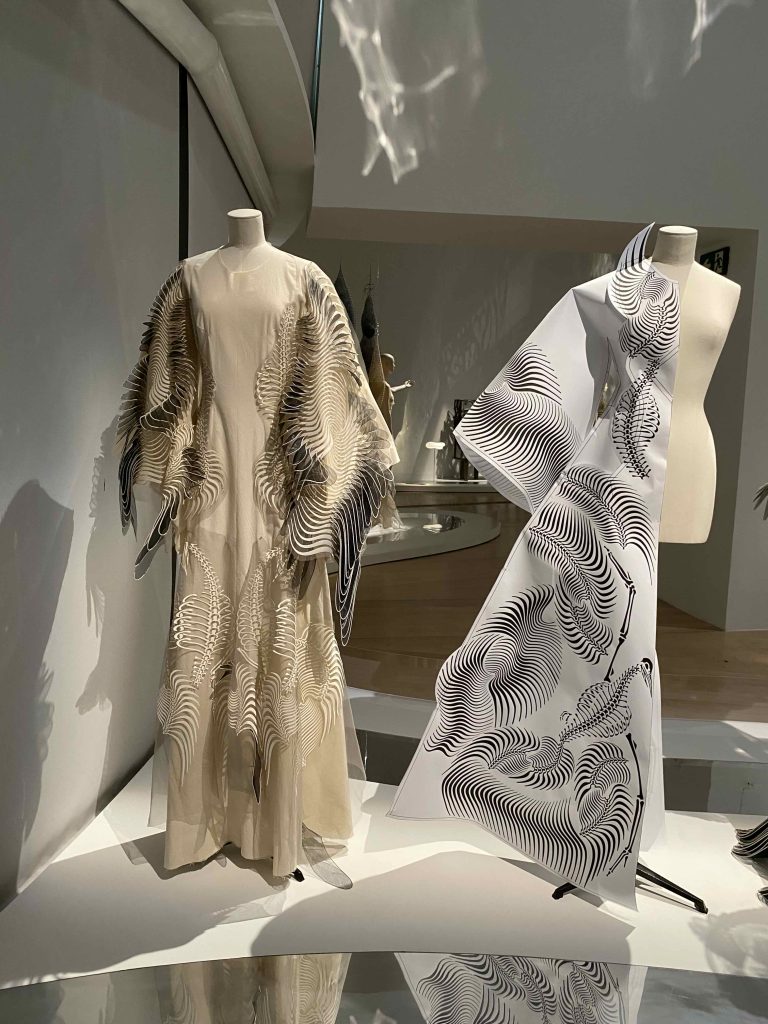
*
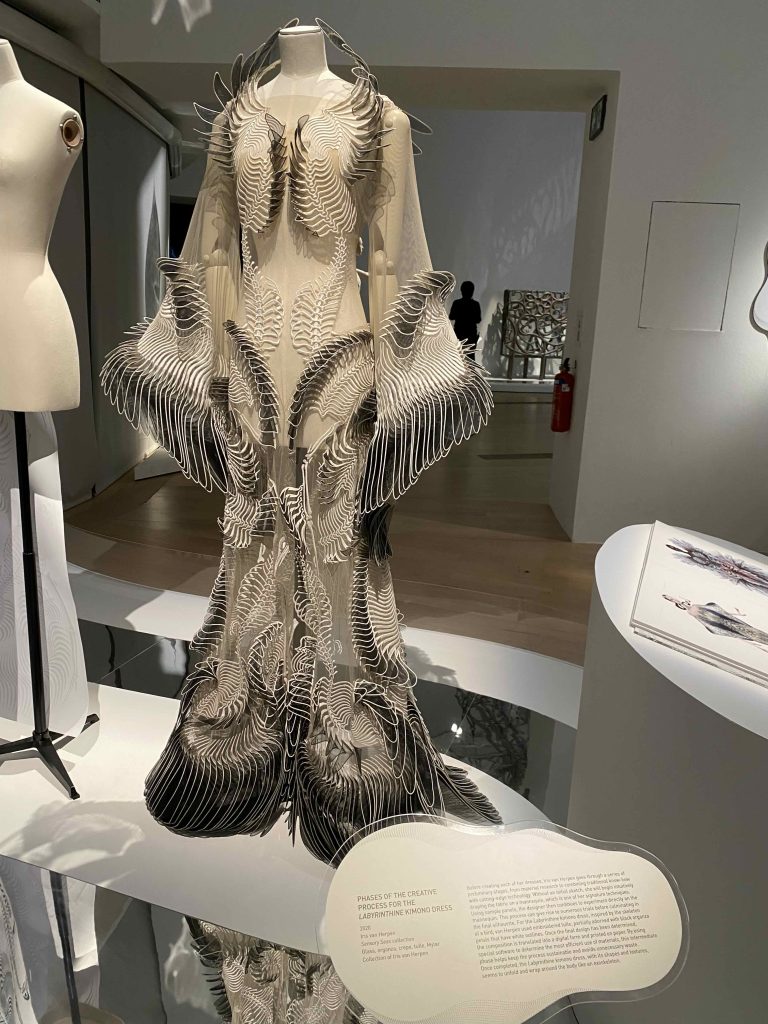
*
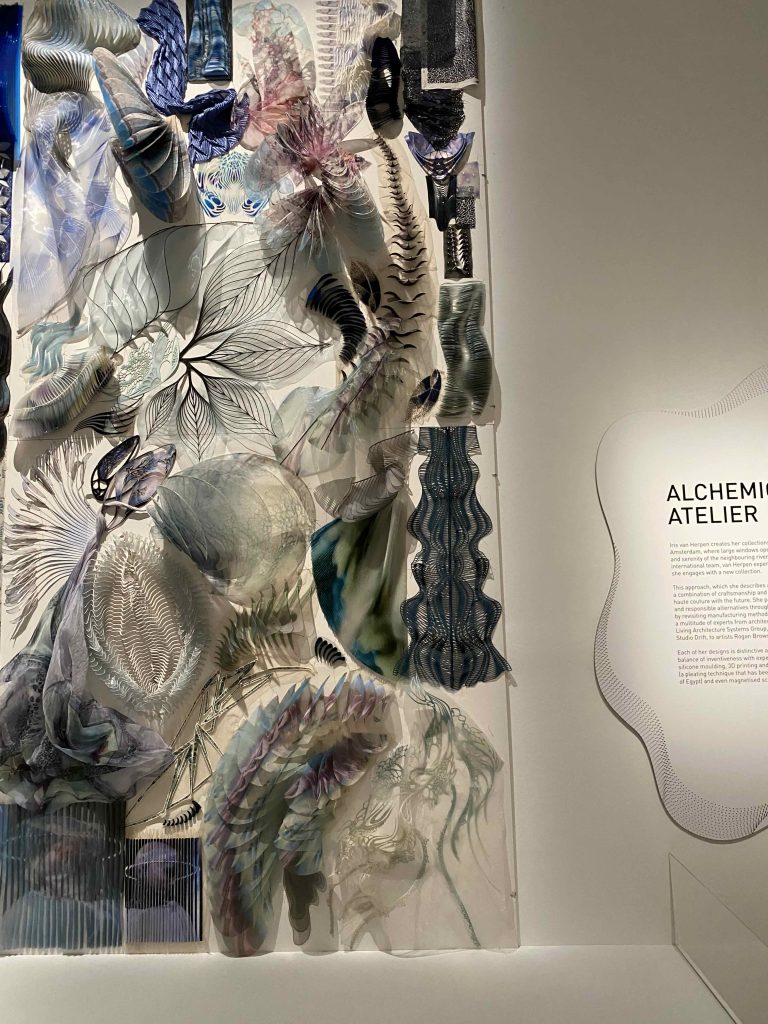
The board is a collage of the many different types of manmade created “fabrics” for Iris van Herpen’s fashion garments. From this collage, you may be able to recognize the materials as used in the various dresses shown above.
“Cabinet of curiosities” show bits and pieces of designs during the process of making a garment.
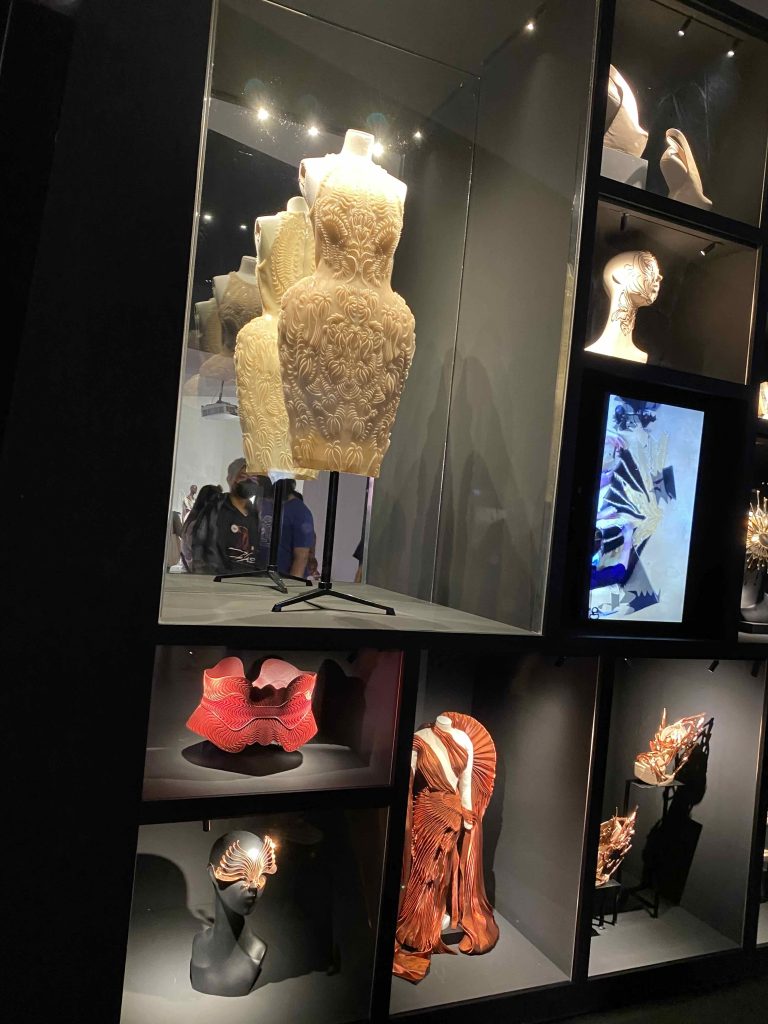
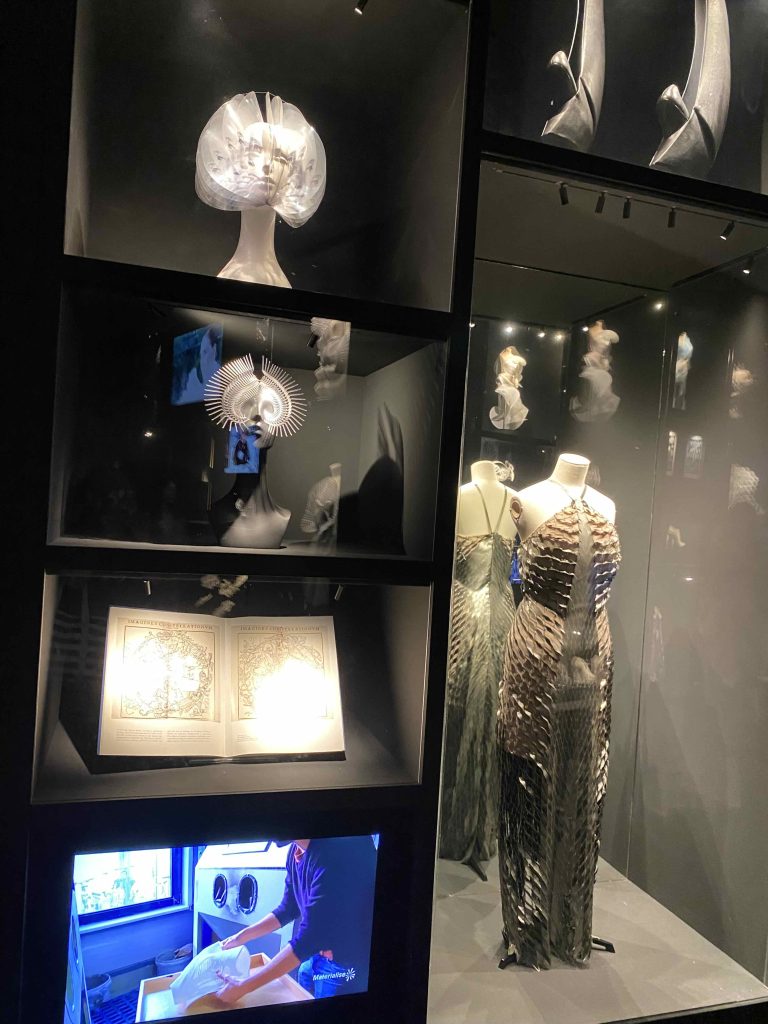
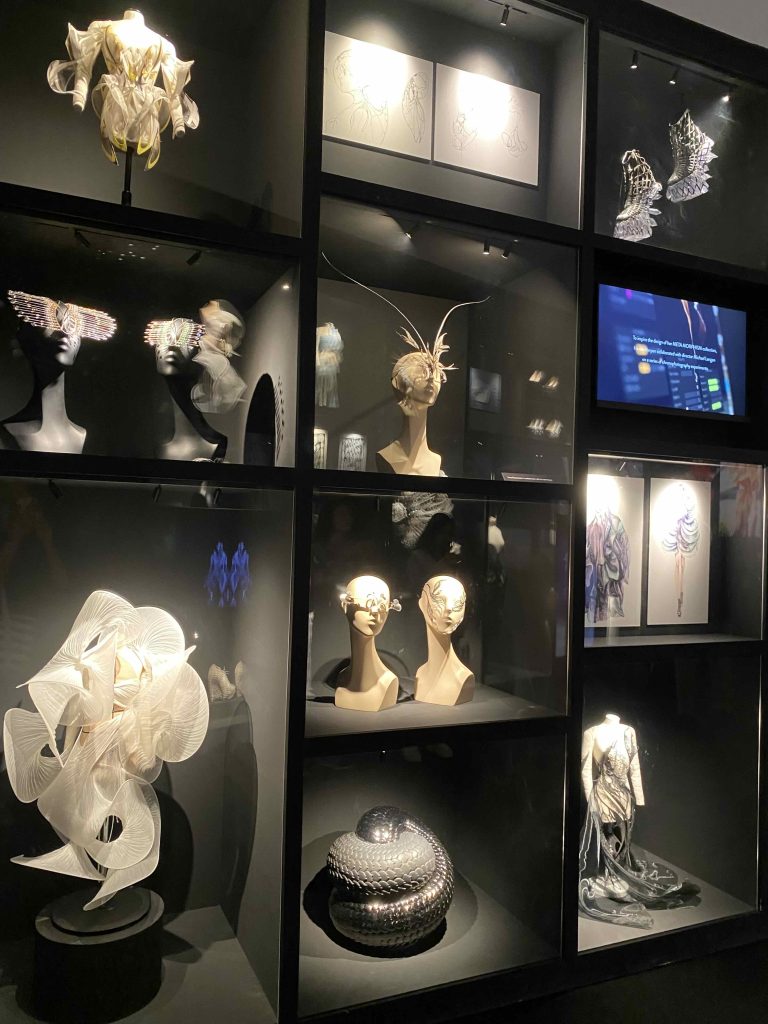
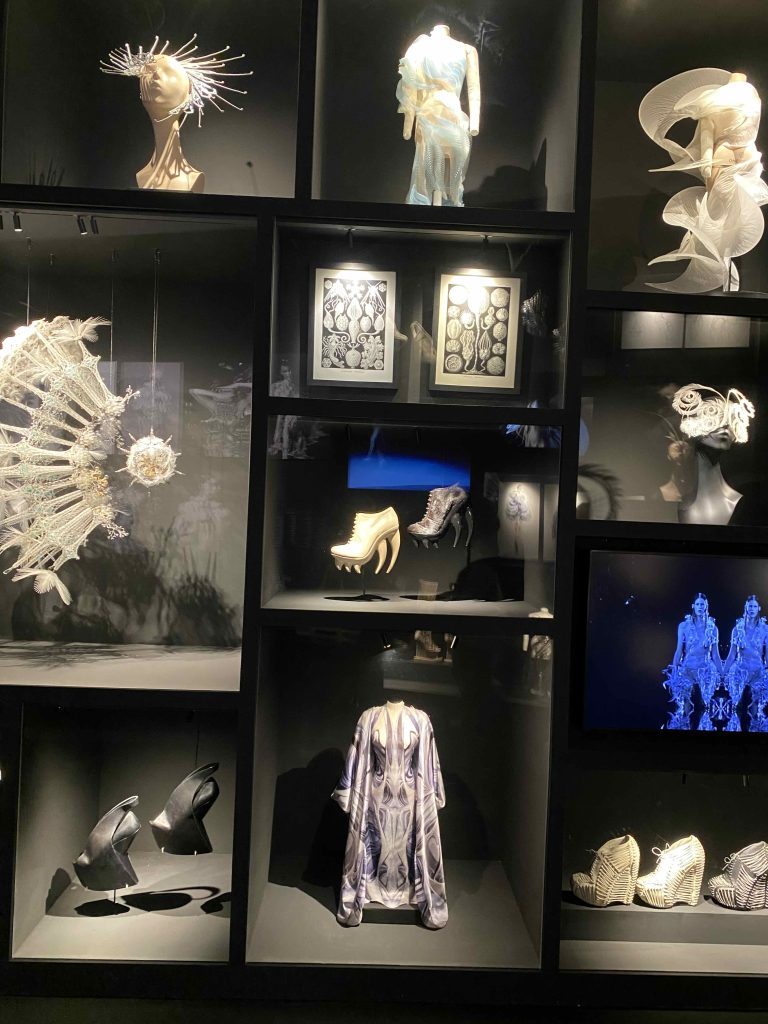
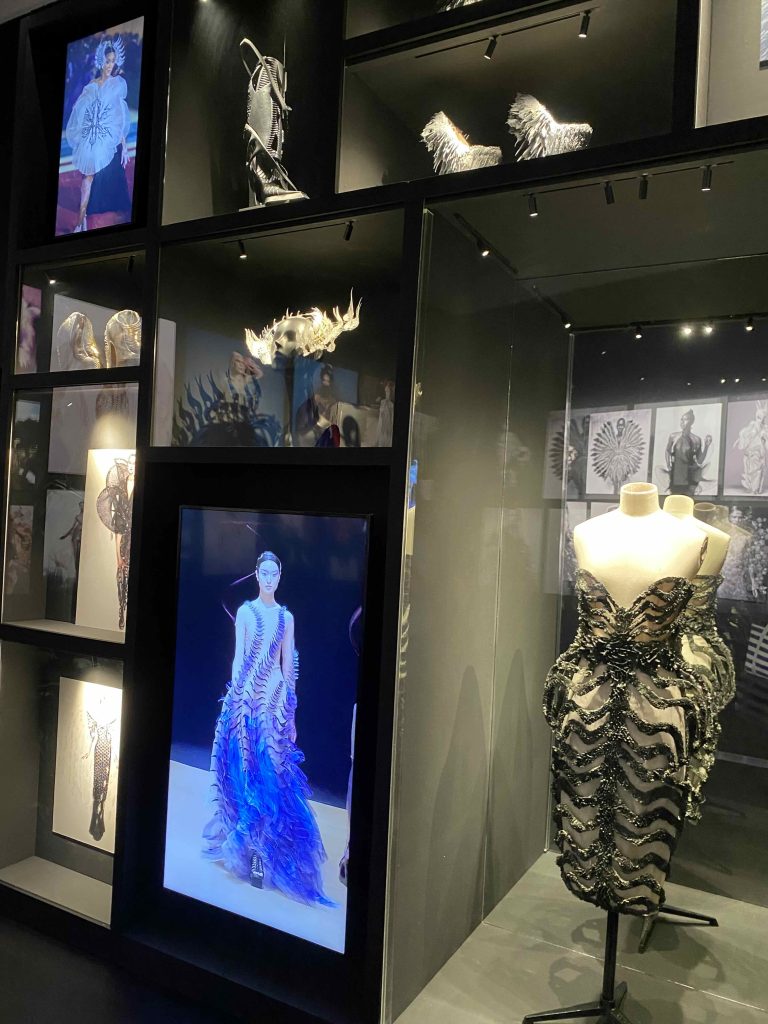
*
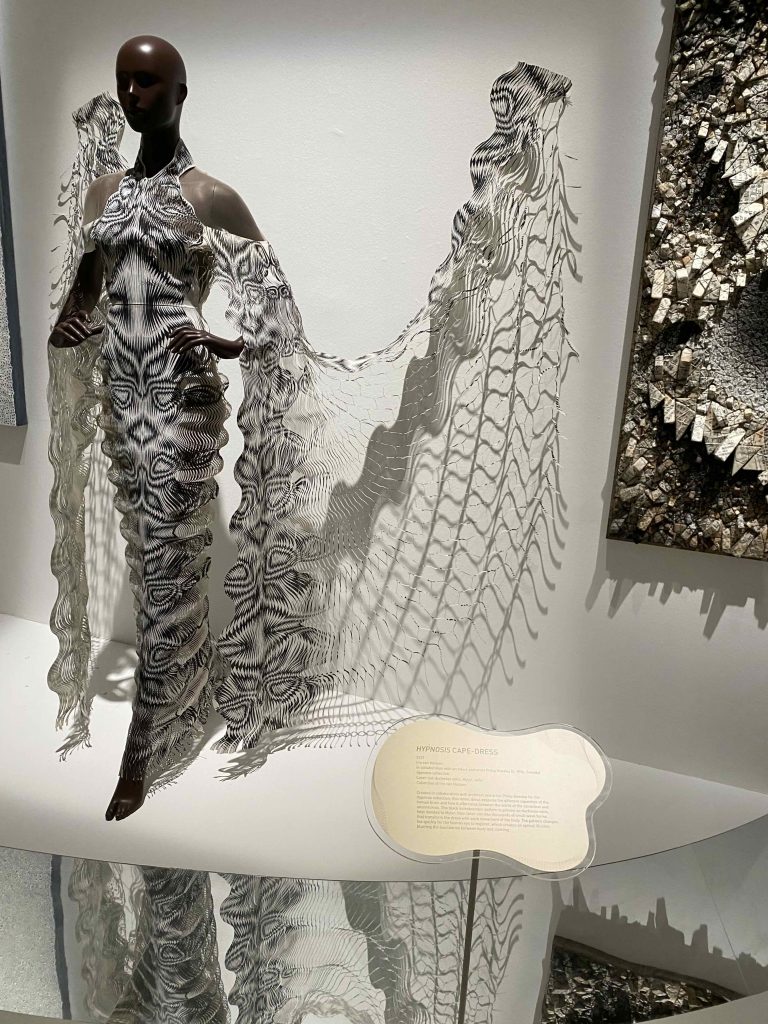
*
The above is the Hypnosis Cape Dress. I guess the pattern is so striking that it keeps eyes glued to it, hypnotizing the viewer. The cape attached at the bodice is designed in such a manner that when expanded, it stretches out to show its made of netting. When the cape is contracted, the compressed netting shows the printed design, which is of paired “eyelets”. I think the best part of this Cape Dress is its cape.
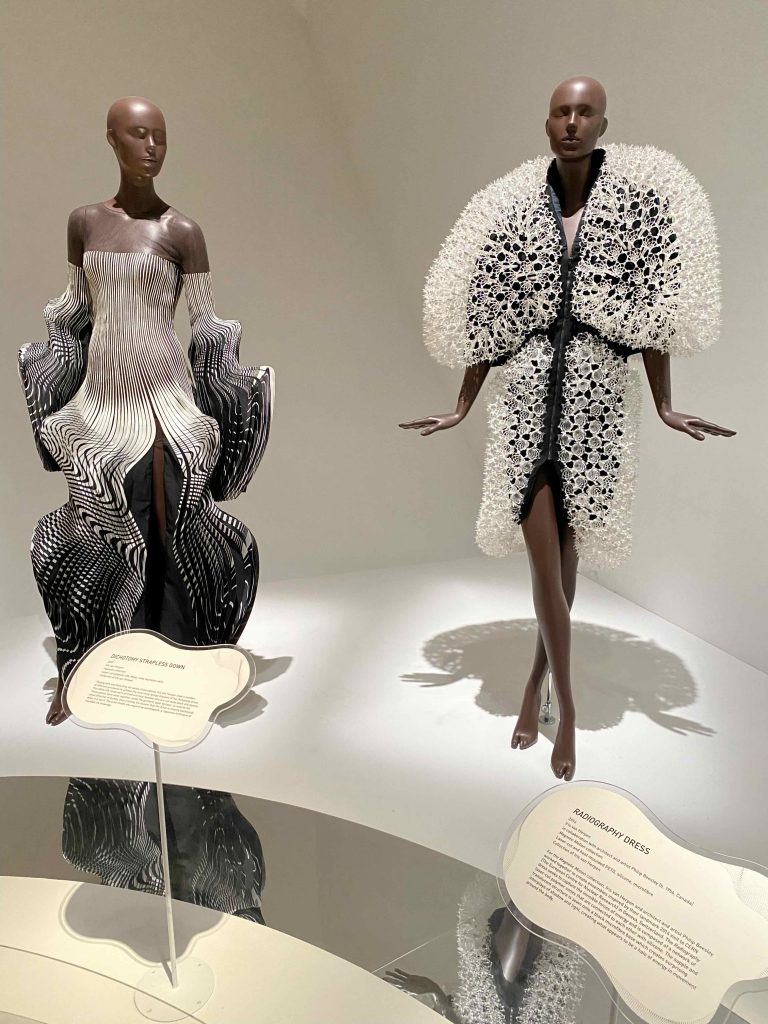
*
The mannequin on the left wears the Dichotomy Strapless Gown, which belongs in the Hypnosis Collection. This dress was sewn to create the illusion that its parts are moving backwards as its fluid motions are an illusion. It is the method of sewing together the panels of the strips that invented the illusion.
The mannequin on the right wears the Radiography Dress. This garment is in the Magnetic Motion Collection. The cones are made of polymer which are laser cut. They look finer than lace. the cones are glued together by silicone. This entire polymer layer is attached to a black colored base dress which shows off the white polymers against a black ground.
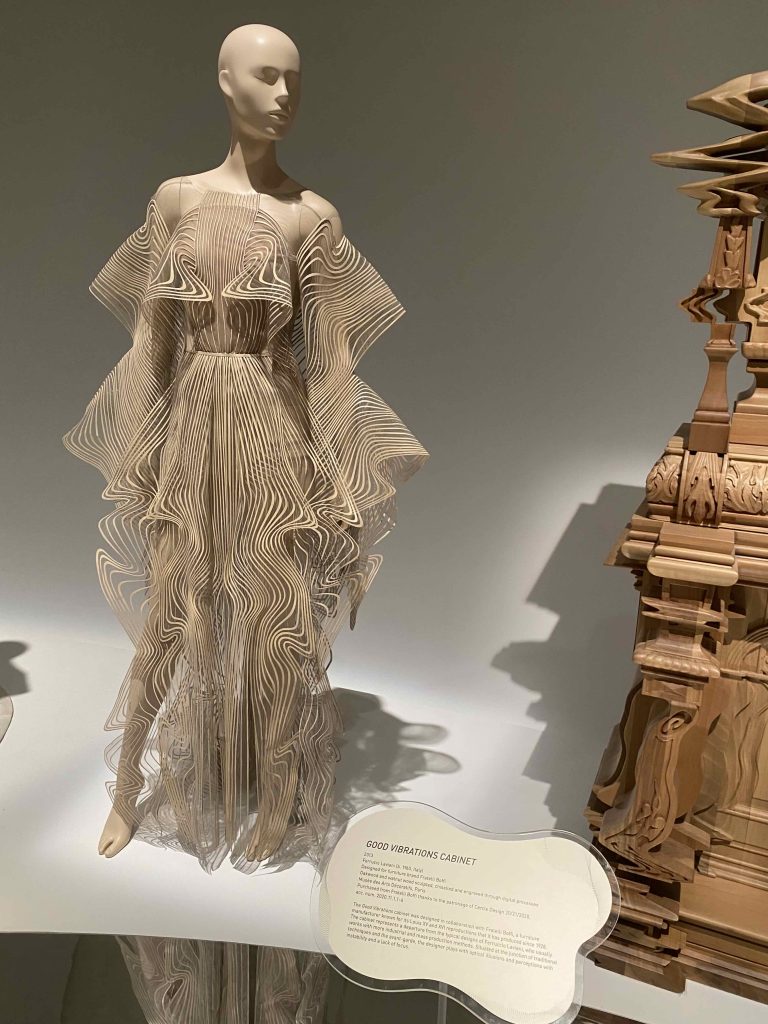
*
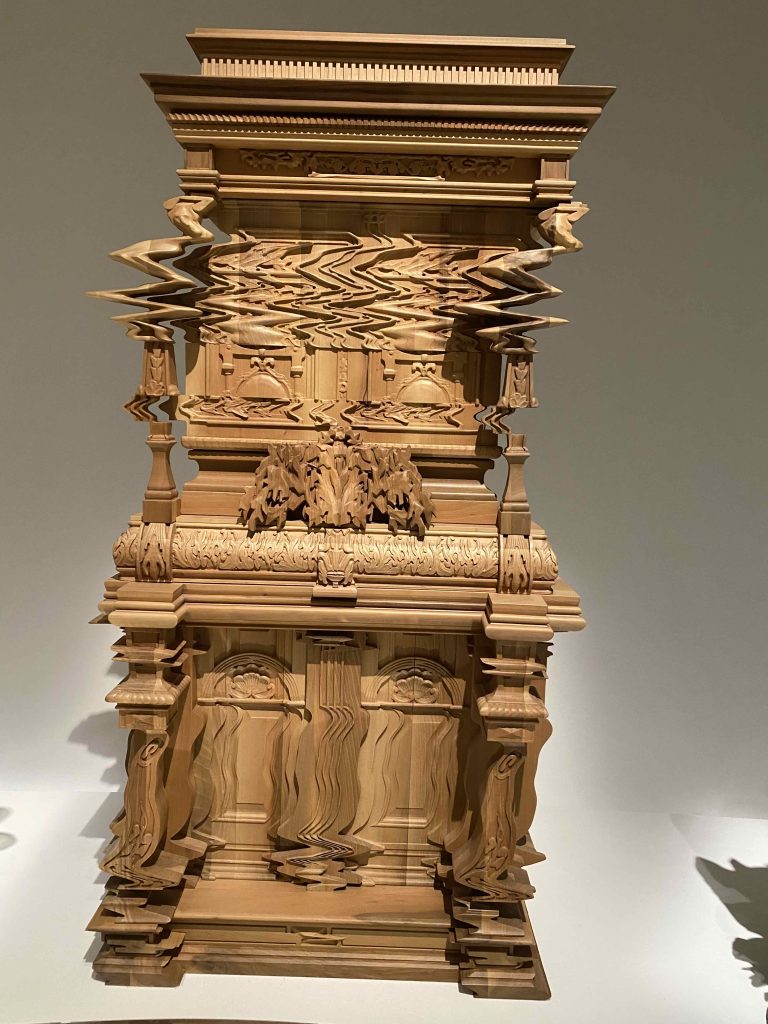
*
The Good Vibrations Cabinet is made deliberately off-center, to look unstable, as it it might topple over to its right. The carvings are ornamental and beautiful. This piece of furniture was bought for the exhibition by a sponsor, who appreciated the vale of showing Ms van Herpen’s other work, alongside her fashion garments. The designers have calculated the center of gravity for the cabinet and it is stable, despite its appearance.
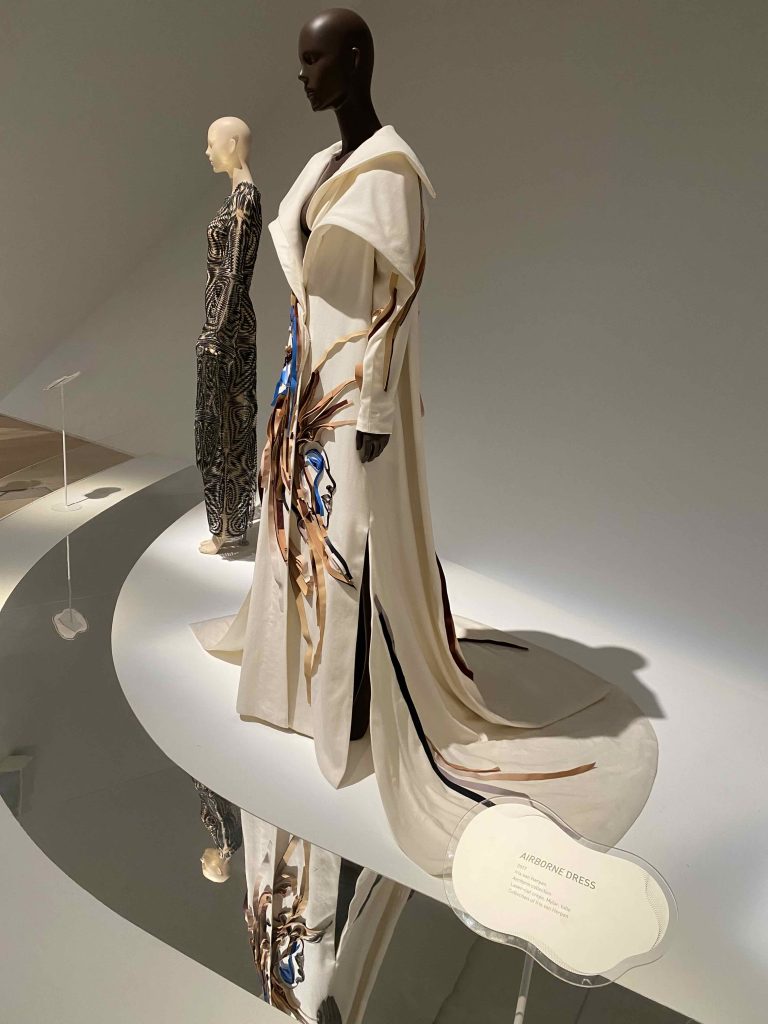
*
The above is the Airborne Dress.
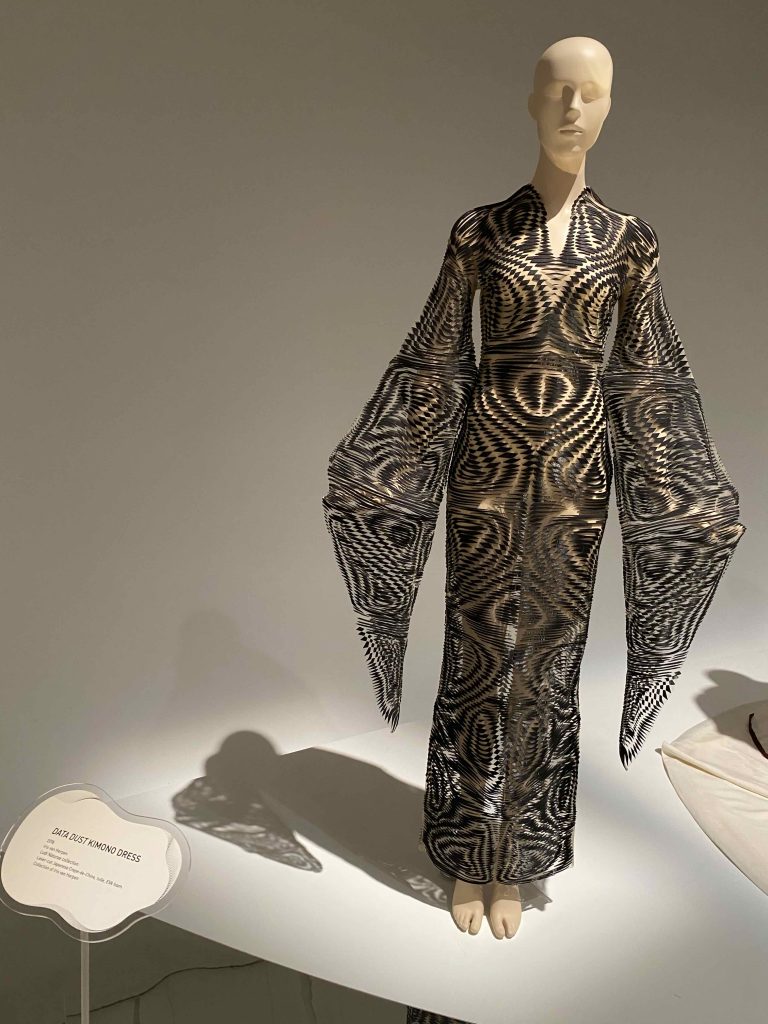
*
The above is the Data Dust Kimono Dress.
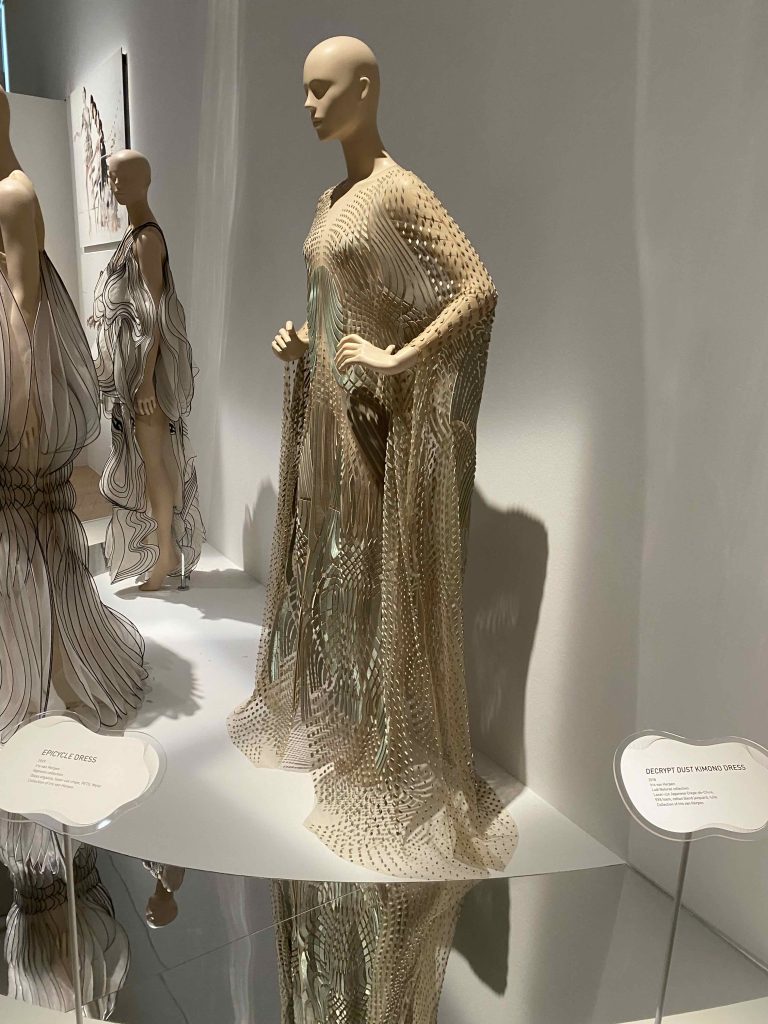
*
The mannequin on the right wears the Decrypt Dust Kimono Dress.
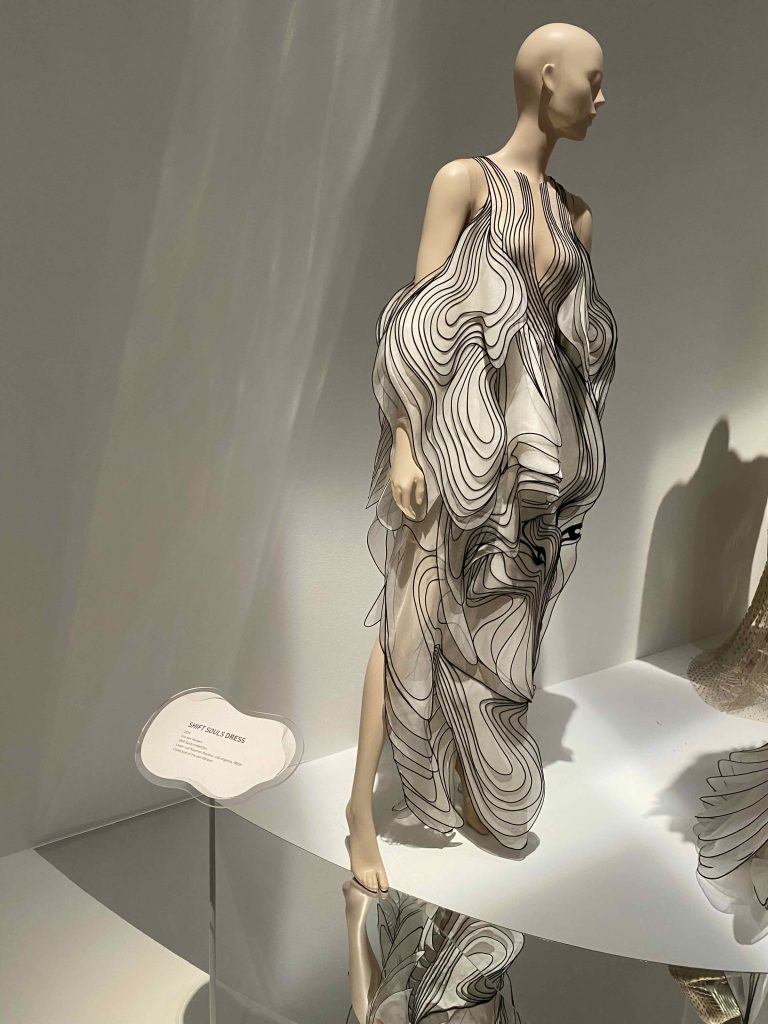
*
The above dress is the Shift Souls Dress.
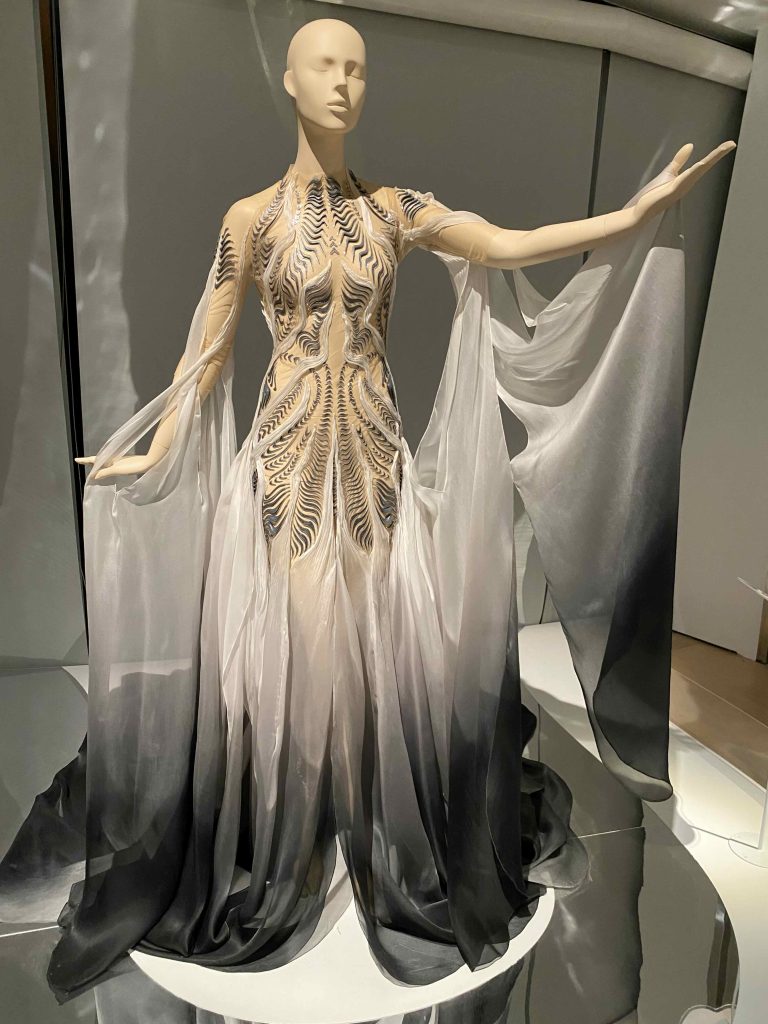
*
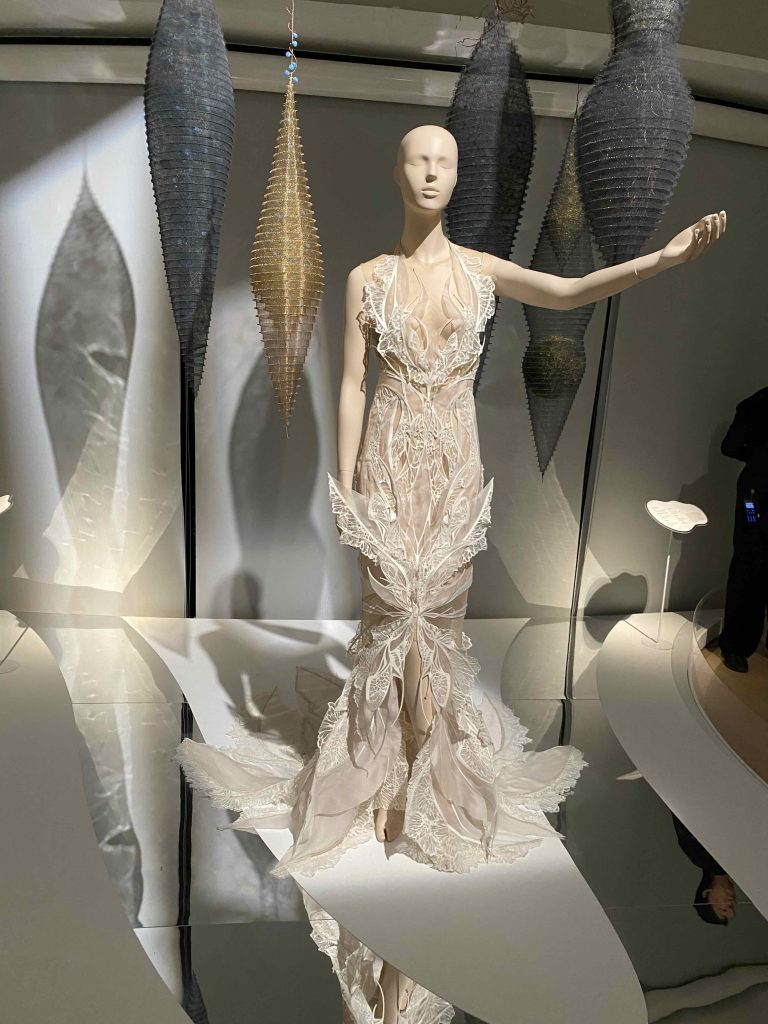
*
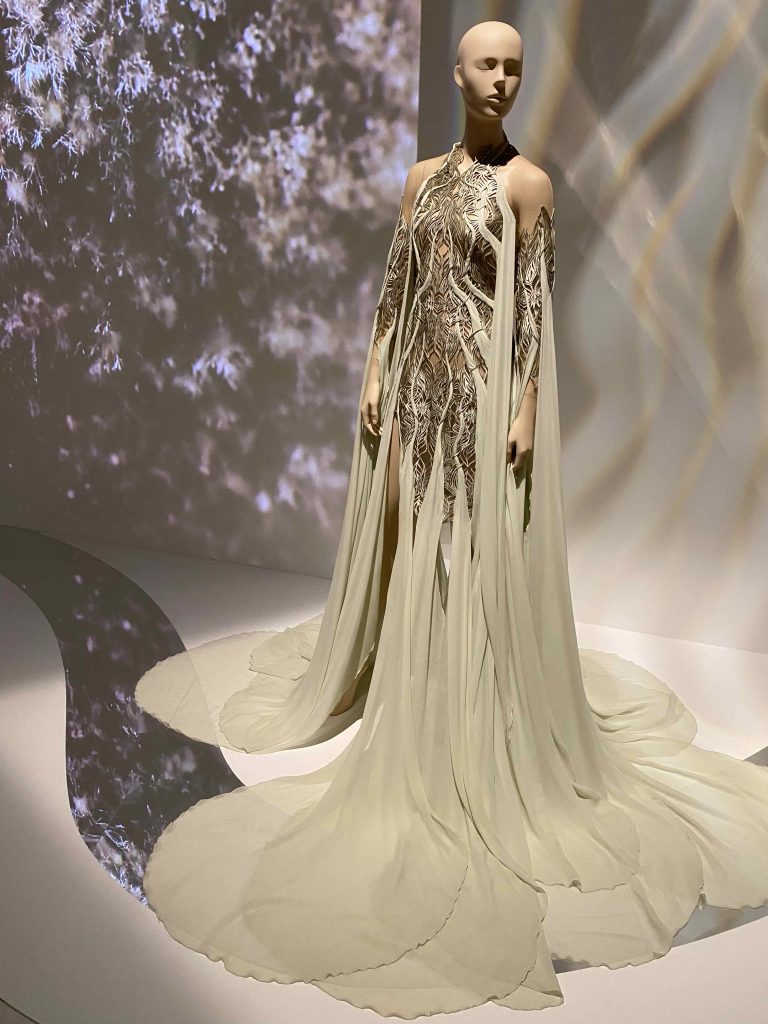
*
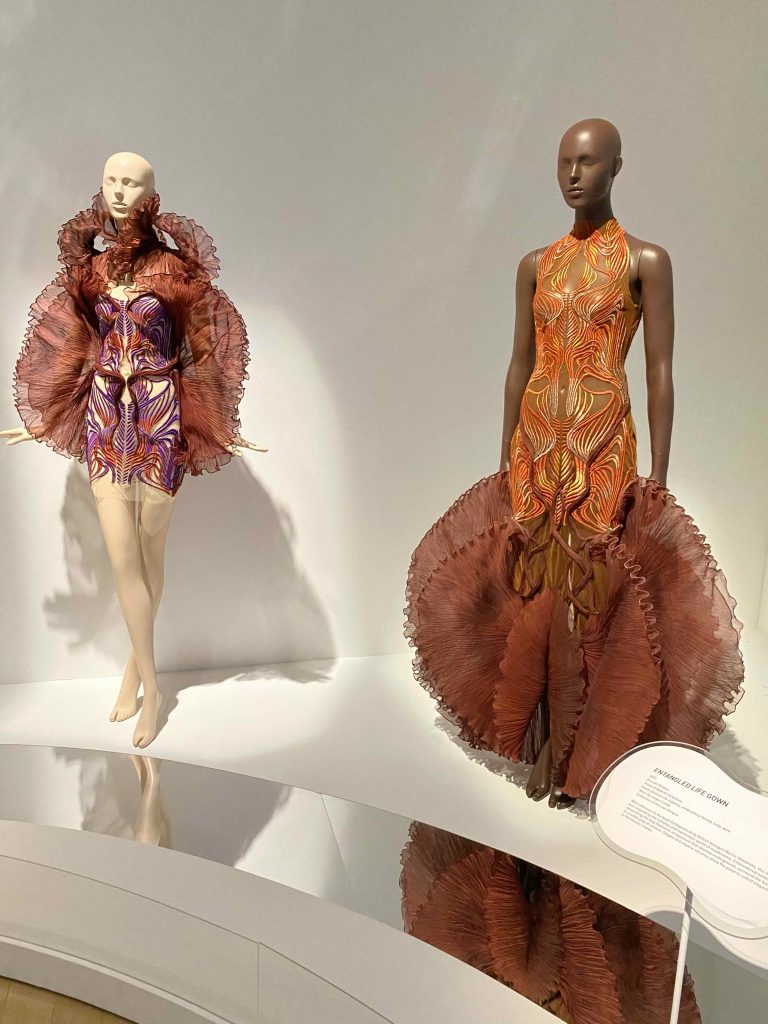
The mannequin on the right is the Entangled Life Gown. The cords that hang down from the mannequin’s pelvis maybe the strings of attachment.
I have many more photos to post and type the write-up. They will be pasted here soon.
Meanwhile, some info on the background music used in the exhibition rooms. Mr Salvador Breed is a sound engineer who created haunting, space-like instrumental music for the exhibition. He is Ms van Herpen’s partner.
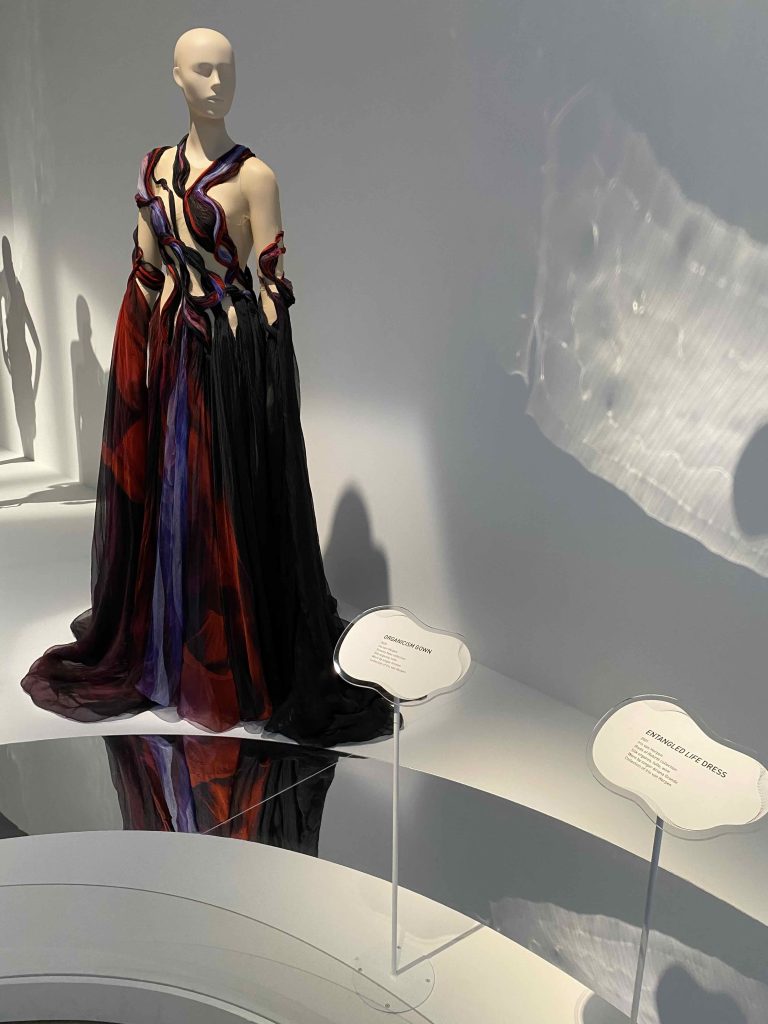
*
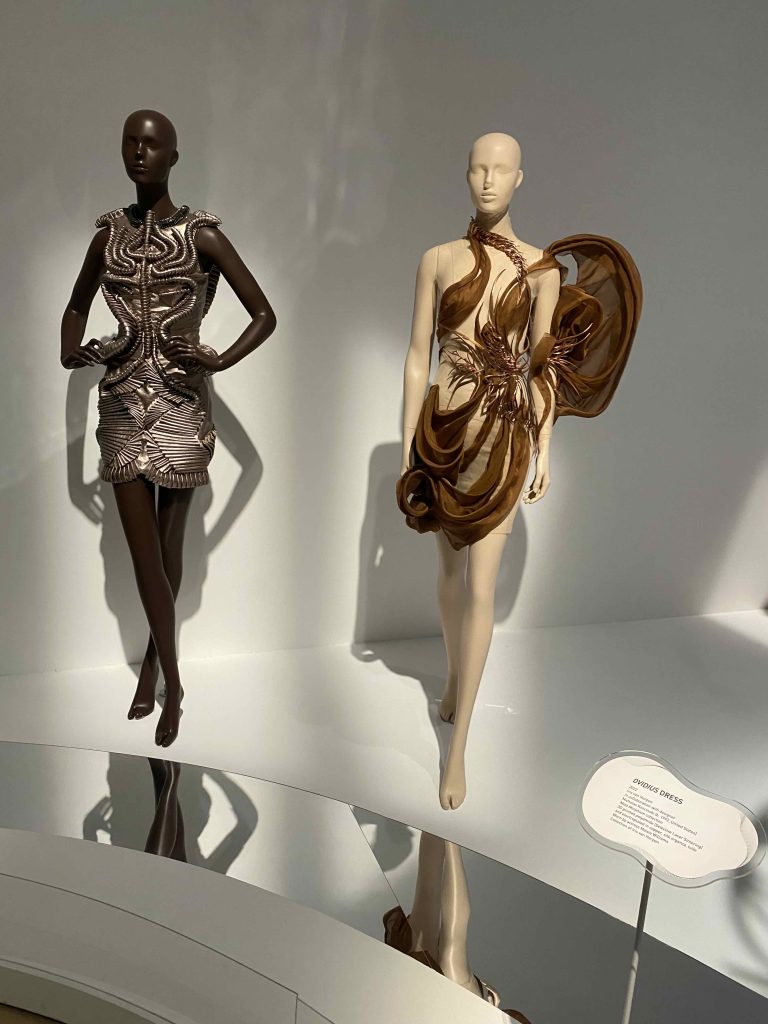
*
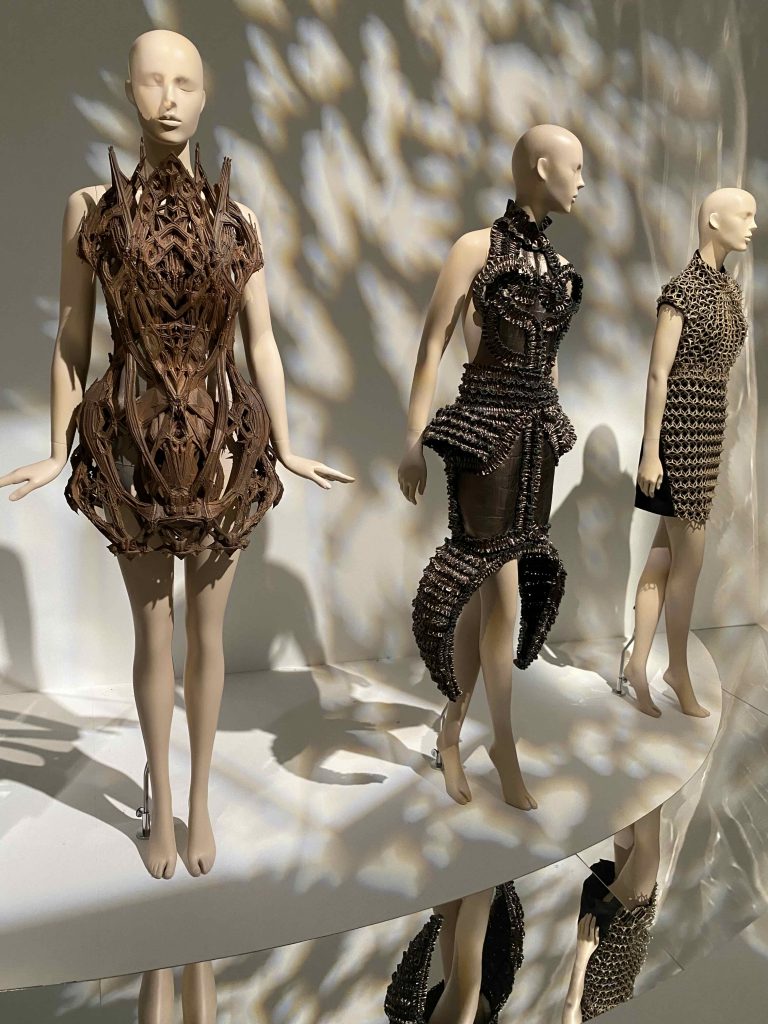
*
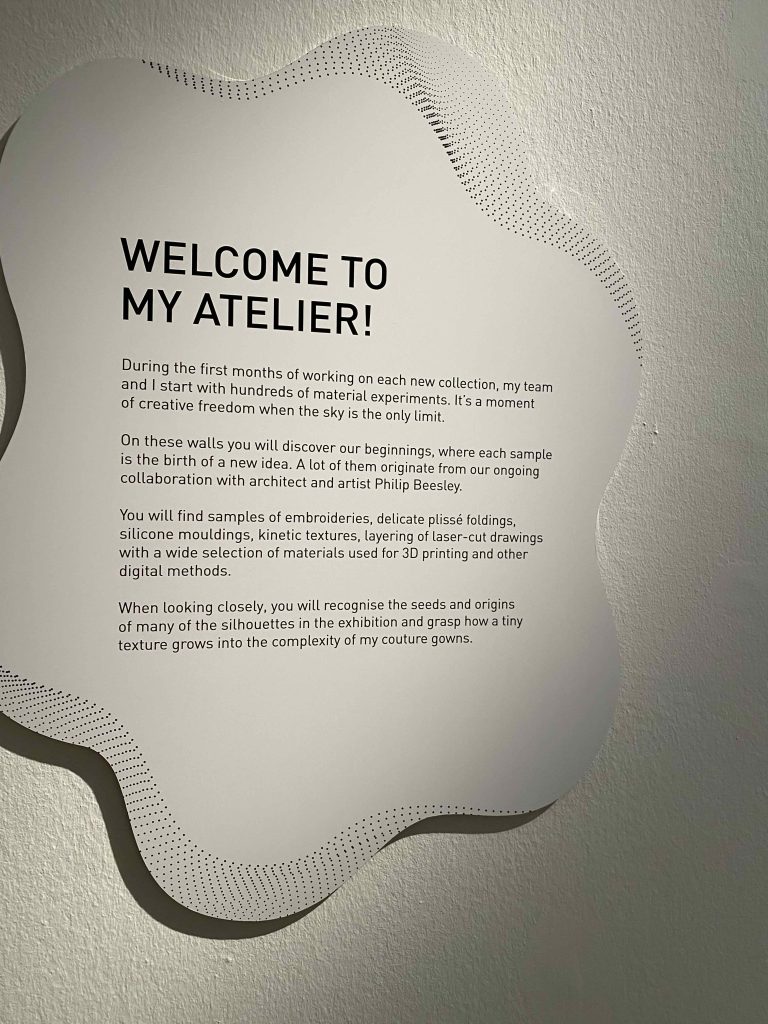
*
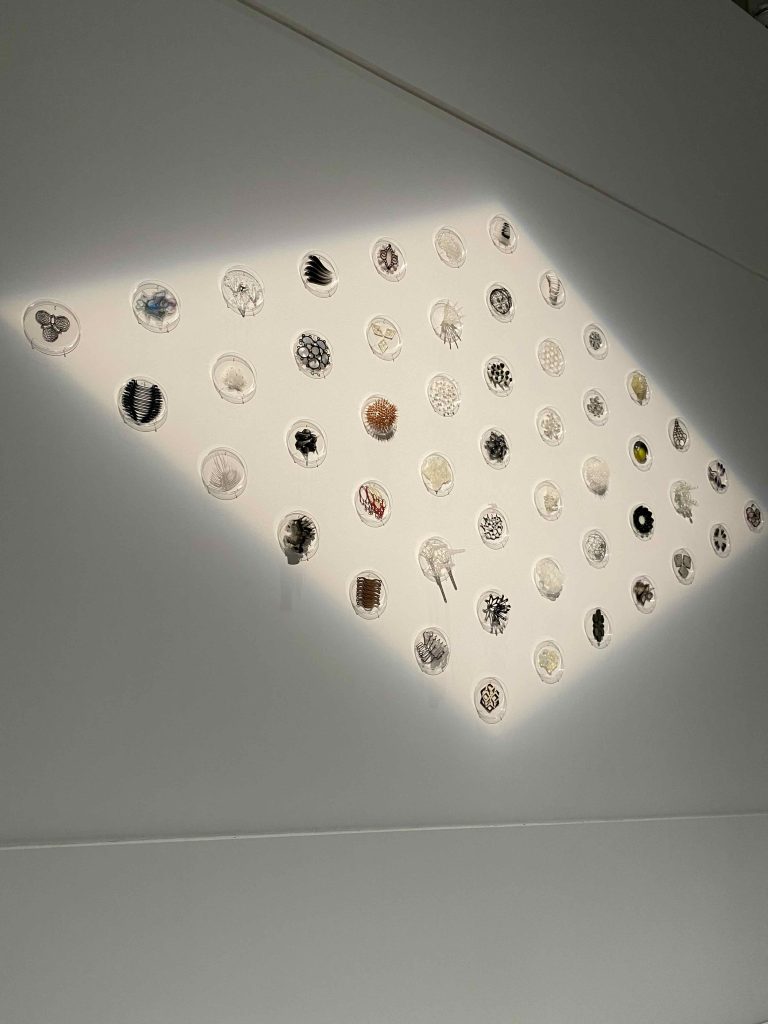
*
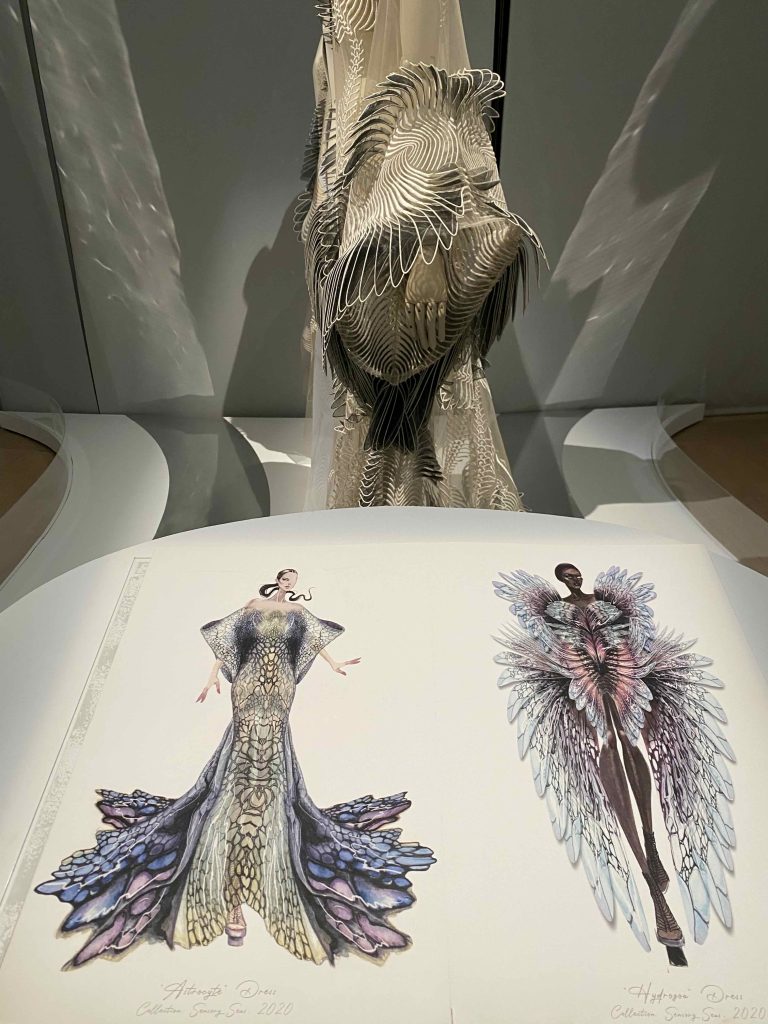
*
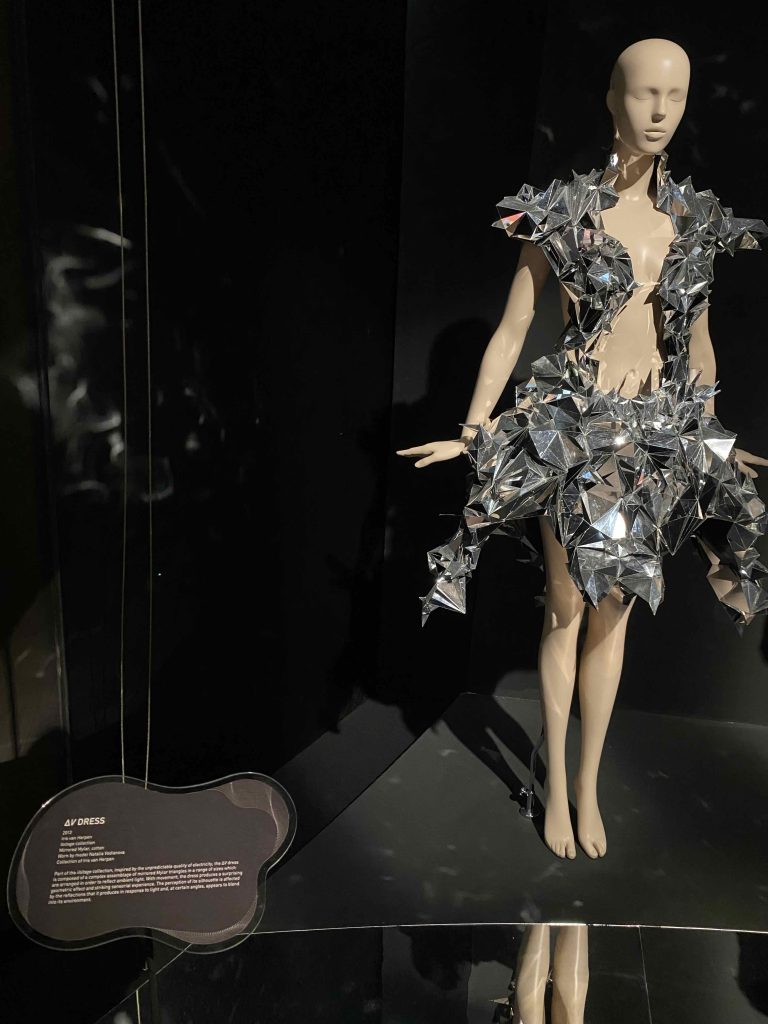
*
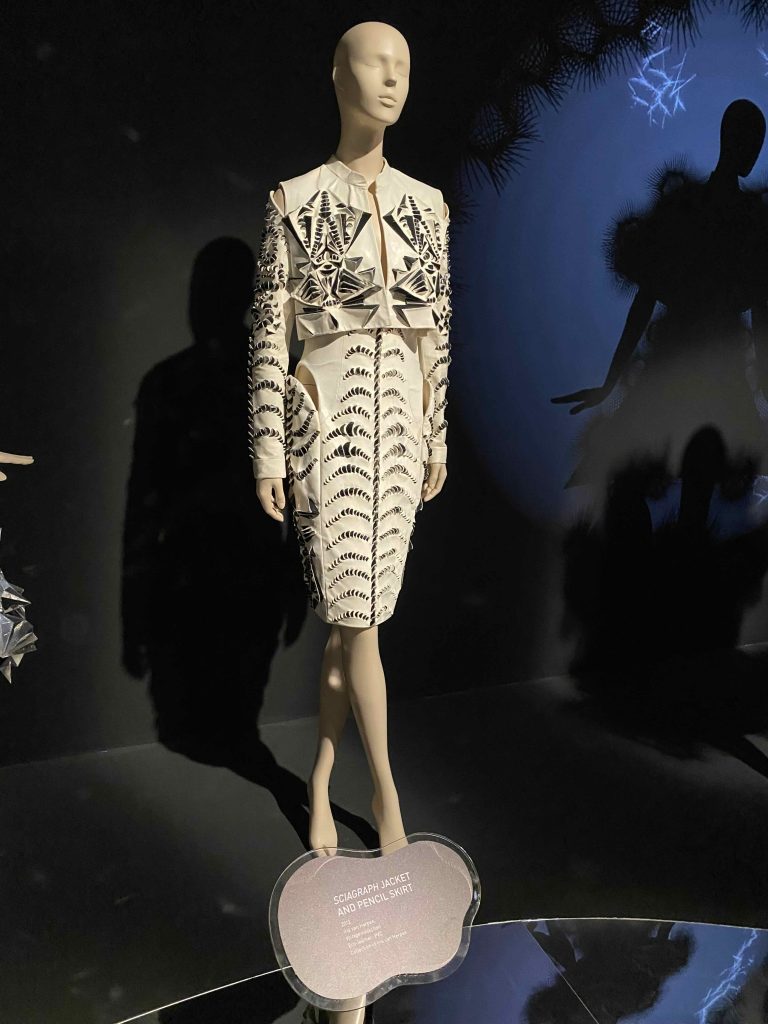
*
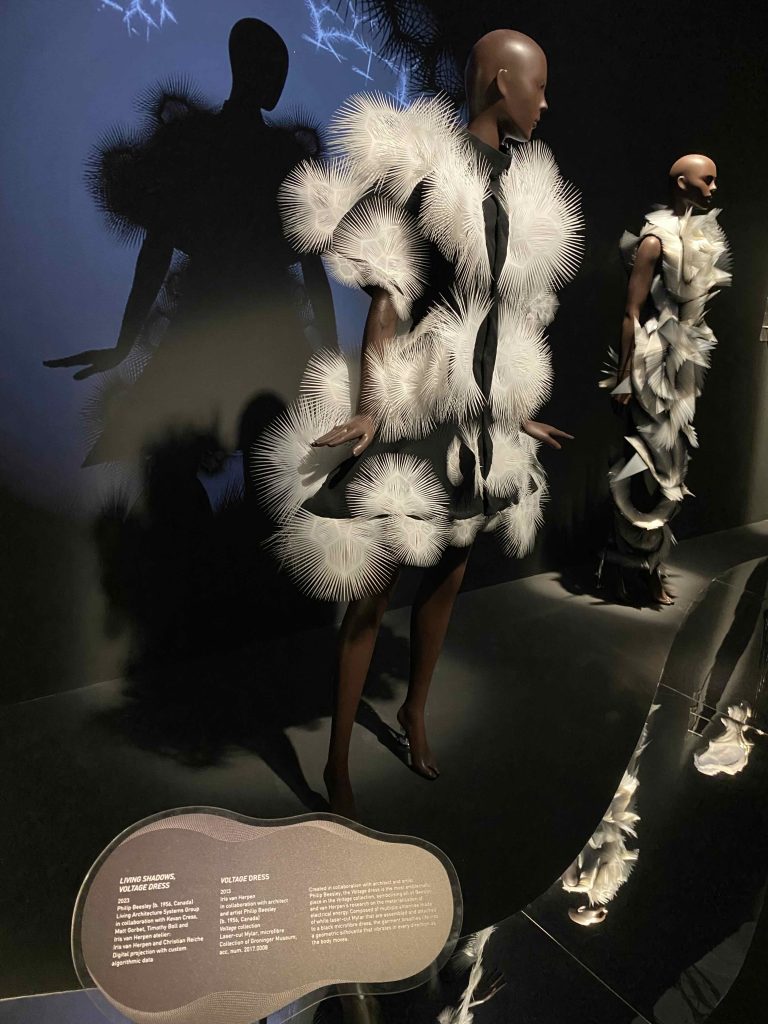
*
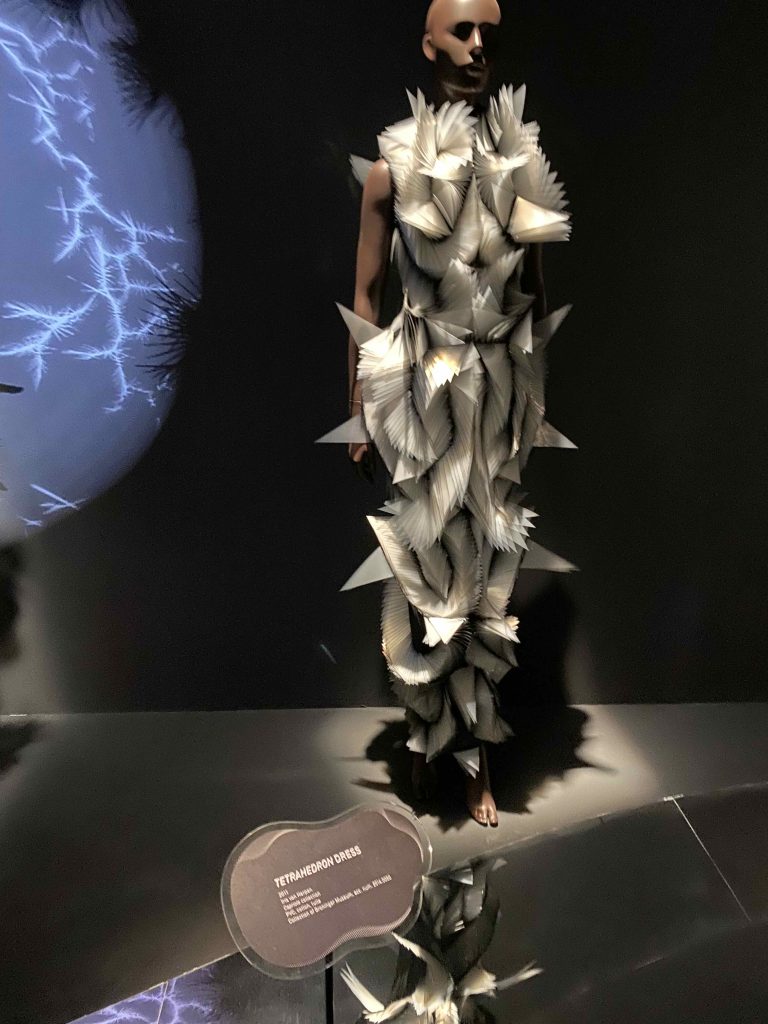
*
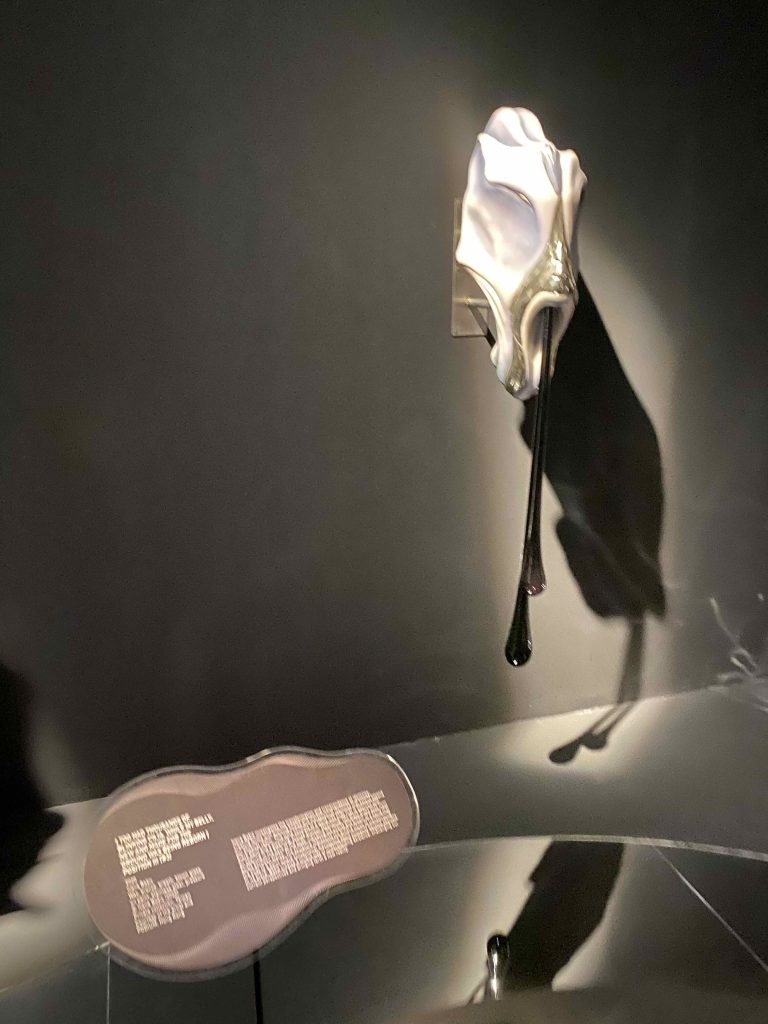
*
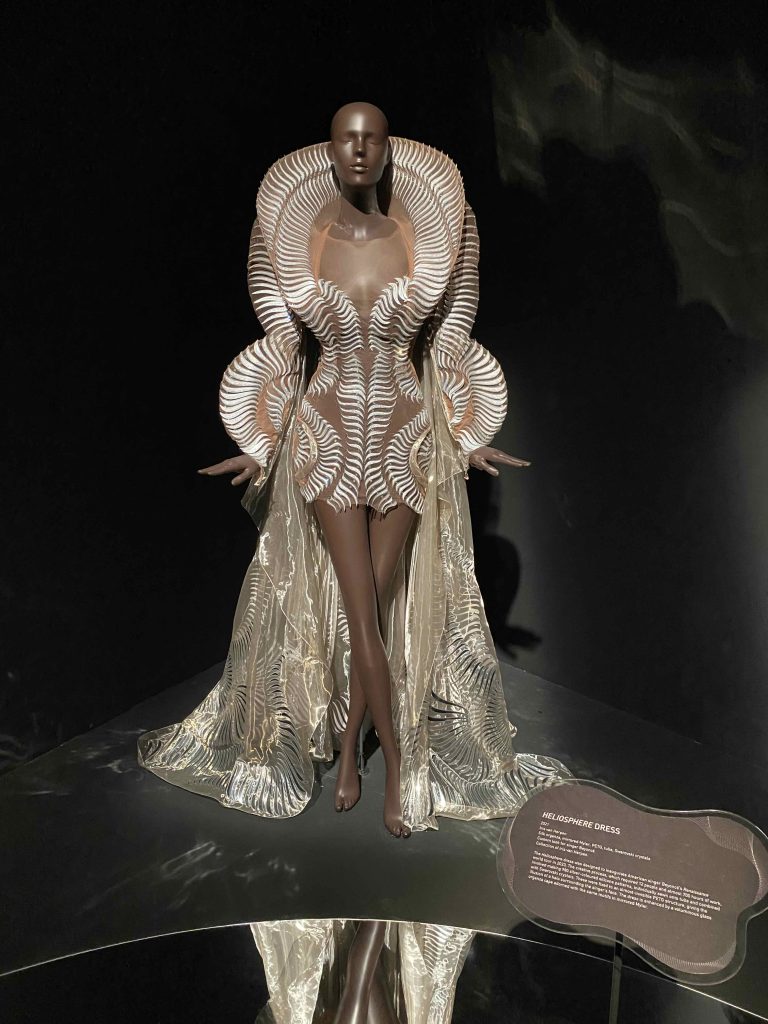
*
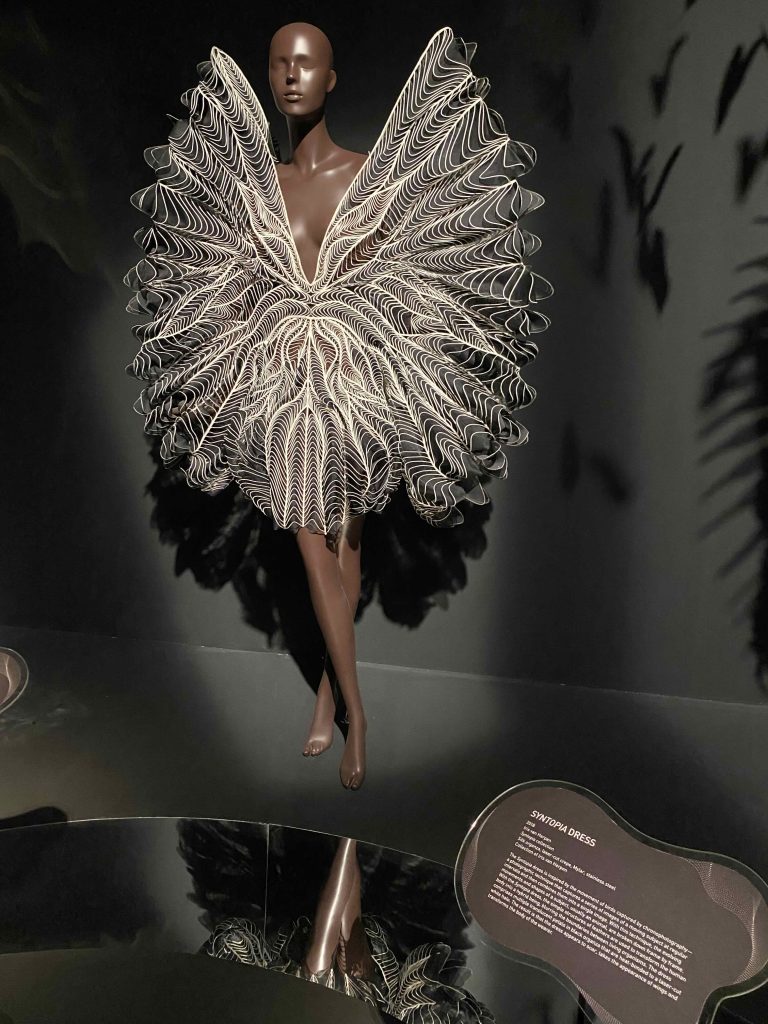
*
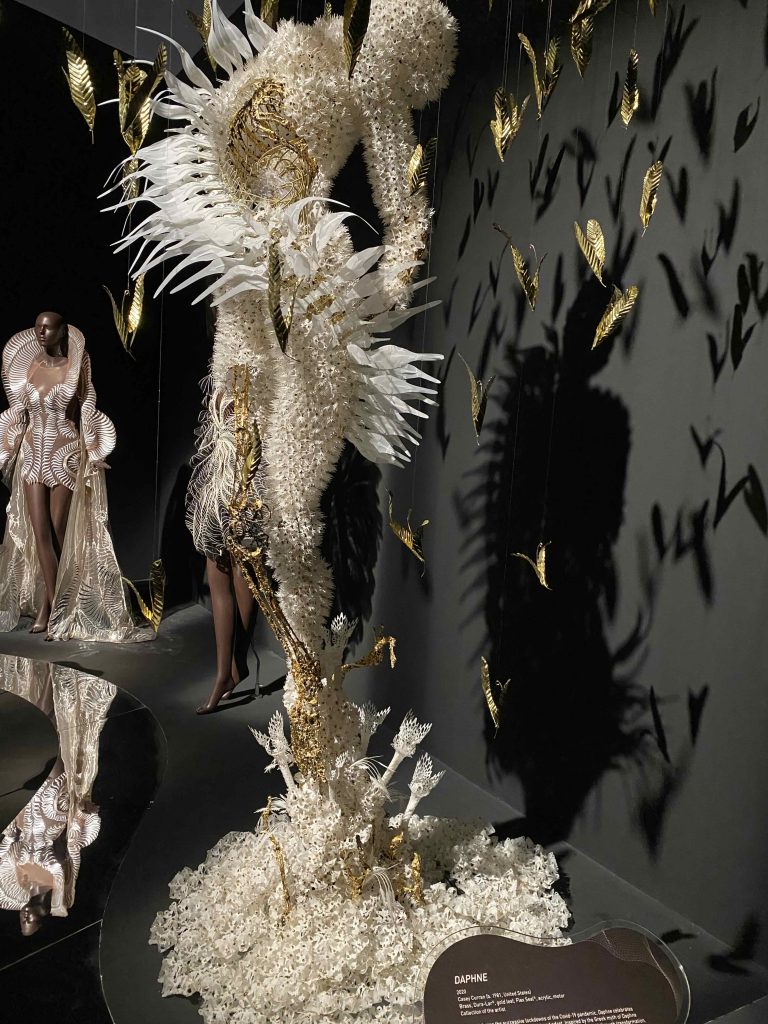
*
Ms van Herpen collaborated with Chris Bellamy, to design a dress with embedded live algae. The algae were grown in a sea water solution to prepare them for being included in the dress’ cape. They are special because they glow with light. There are 125 million bioluminescent Pyrocystis lunula algae in this experimental dress. While this dress is relevant for this exhibition, these algae are cared for with light, sleep and consideration for their survival. What happens after they are no longer needed? Would they be returned to the ocean?
What a fascinating display!